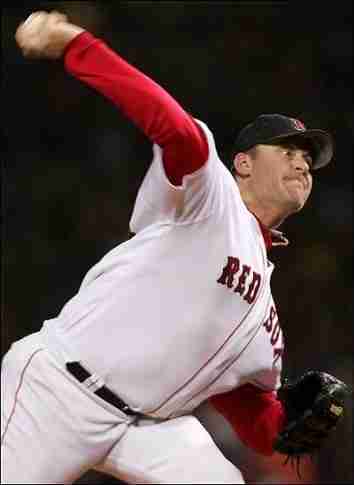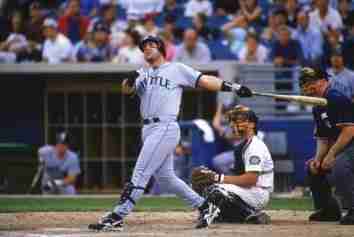Hall of Fame Debates (95)
Orlando Pace: 2015 HOF Finalist
Jan 13, 2015
Written by
Committee Chairman
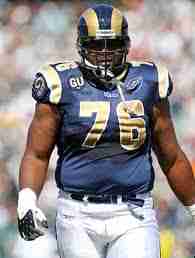
Having a lot of fun doing our Baseball debates with two of my bloggers, DDT and the Phillies Archivist, I wanted to repeat the same idea with this year’s Football Finalists, but due to time constraints I will take a deeper look at each candidate myself and offer a few thoughts as to their Hall of Fame candidacy
First up, I take a look at former Offensive Tackle, Orlando Pace.
You had to know that the St. Louis Rams “Greatest Show on Turf” team was going to have multiple names make this year’s finalists. Along with Kurt Warner, Isaac Bruce and Torry Holt, Pace was one of four members of the Super Bowl XXXIV Championship team that became eligible all in the same year. Personally, I thought that either Bruce or Holt would join Warner and Pace, but perhaps those deciding the fate of the Finalists thought that two Rams were sufficient or maybe Bruce and Holt cancelled each other out.
That aside, when you talk about those great Rams teams, the names of Warner, Marshall Faulk, Bruce and Holt received the press, as you would expect; skill positions always do, but would St. Louis have been as good without Orlando Pace helming the Offensive Line?
Protecting Warner and opening up gaping holes for Faulk, Pace gave the Rams exactly what they hoped for when they selected him first overall from Ohio State in 1997. In the twelve years that he played for the Rams, they had more gross yards than any other team in the National Football League and he blocked for three consecutive MVPs (Warner twice and Faulk once).
Legacy wise, Orlando Pace is regarded as one of the three Left Tackles of his era who were considered among the elite; the others being Walter Jones and Jonathan Ogden, both of whom just entered the Hall of Fame, leading to a lot of reason to think that Pace should be able to follow them both into Canton.
Trophy wise, Pace has what you want for a Hall of Fame candidate. His resume brings three First Team All Pro Selections, seven Pro Bowls, a selection to the NFL All Decade Team (2000’s), the 2008 Ed Block Courage Award and of course that Super Bowl Ring.
So what works against him?
Well much like Harrison and Holt may have had a cancelling of each other out, it is possible that the same could happen for Pace and Warner, or that the committee may wish to only one put St. Louis Ram in. There is no urgency to induct either one of them, and with all due respect to Warner and Pace, there will not be that large of an uproar if either of them do not get in on the first ballot.
What also may play against him is Will Shields, who although played on a different position on the Offensive Line (Right Guard), but nevertheless there is an O-Lineman, and with limited spots available, Shields, who has been a Finalist already for the past three years might get the nod. Also, Senior Candidate, Mick Tingelhoff, is a Center, and Senior Candidates have had a better than 60 percent chance once they make this round.
So would I cast a vote for Orlando Pace? Yes, and I do think there is a very good chance that he will get in on his first try, but if he fails I don’t see him waiting a very long time. I will go on record that I would prefer for him to be first Ram Super Bowl winner over Warner and for the sake of what might be a perceived St. Louis log jam (never underestimate how voters think about things like that), I sincerely hope one of them does, to ease a path for Holt or Bruce, both of which who are deserving of at least an extended look as a Finalist.
Saying that, I have a sneaky feeling that Warner will get the spot over Pace, and Shields might slide ahead. My official prediction is that the very deserving and Hall worthy Orlando Pace will enter Canton…but on the second try.
The Larry Walker Debate: 2015
Dec 31, 2014
Written by
Committee Chairman
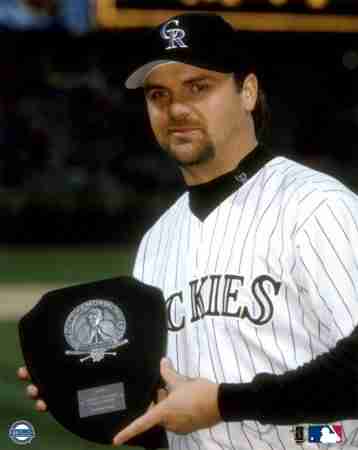
This is the twenty-fourth and final of our series where we here at Notinhalloffame.com, do what else? Debate the merit of twenty-four men on the most loaded Baseball Hall of Fame ballot in our lifetime.
Joining me, the site's Committee Chairman, in this debate are D.K. of the site's Phillies Archivist blog and Darryl Tahirali of the site's DDT's Pop Flies blog. This looks to be a very important part of our site, and we hope you will enjoy reading this as much as we enjoyed writing it.
Chairman: Every single time the Baseball Hall of Fame and Larry Walker are in the same sentence together, most bloggers, writers, pundits and fans counter with two words: Coors Field. While I think there is some legitimacy to that argument, this is a guy who still put up good numbers in Montreal, had good numbers on he road while with Colorado, and by the way these are the same guys (the writers) who talked about the Coors effect and voted him the MVP of the National League in 1997. Walker is on the 5th ballot, and last year he had his lowest total yet with 10.2%. On the surface, this is not a path to Cooperstown.
D.K.: Walker was a .320 career hitter until late in his career. If he had played one more season instead of retiring at age 37 he would have reached the 400 HR plateau. (Like Mussina, he apparently wasn’t interested in establishing a statistical legacy). Walker had some years where his batting average, on base percentage and slugging percentage, plus those two last categories combined were absolutely Crazy Good! However, the voting writers choose to look on this as just an aberration of having Coors Field as his home park.
I think the writers should re-examine Walker’s career rather than just dismissing his numbers as being, the product of having a great park to hit in.
Walker’s inability to attract votes also looms like an ominous dark cloud over the future candidacy of the greatest Colorado Rockie of them all, Todd Helton!
Darryl: I've been writing about Larry Walker since my first article for this site, and in my 2013 ballot evaluation I went into detail about Walker and the "Coors Effect." First, Walker played less than 30 percent of all his games at Coors, and his last two seasons of his nine total were after the Colorado Rockies began storing baseballs in a humidor to neutralize the park's altitude effects. Prior to coming to Colorado, Walker played five full seasons in Montreal's Olympic Stadium, and in three of those seasons the stadium was considered to be a pitchers' park. When Walker won the NL MVP in 1997, he posted a .346/.443/.733 slash line on the road, and he actually slugged better on the road—his home slugging percentage was .709 while he slugged .733 on the road—and he hit 29 of his 49 home runs that year in ballparks other than Coors Field. In short, Larry Walker could hit anywhere, he was a five-tool player, and he ranks 10th all-time among all right fielders according to Jay Jaffe's JAWS system. The nine ahead of him are all Hall of Famers while Walker is ahead of Hall of Famers Paul Waner, Sam Crawford, Tony Gwynn, Dave Winfield . . . Every year I repeat myself on this. Not that it will help Walker. The writers won't elect him.
Chairman: We are all on the same page, beating that dead horse. Walker could conceivably fall off the ballot this year and hardly anyone would care. The numbers bear everything out, the Coors advantage was proven statistically not to be as big an impact on his overall career as people think, but again the writer’s just don’t care, and the ones that do don’t seem to have any impact. He is going to stay on the ballot just so that we have this same discussion every year.
D.K: Walker was indeed a 5-tool player as Darryl attests. He could field and had an excellent throwing arm to cut down runners or to make them not even think about trying to stretch those singles into doubles.
The advanced statistics systems that have come into vogue recently bear out what I had always felt in my gut - that Walker could hit no matter where he played or how challenging a park’s dimensions might be.
Here’s hoping he gets a larger share of votes this year. Up to this point he has been about the most underrated and underappreciated candidates in recent writers’ ballots history.
Darryl: I think Larry Walker is a bellwether for players whose home park was Coors Field, and his fate will have an impact on Todd Helton when he becomes eligible, although Helton played his entire career in Colorado and Walker did not. The larger issue is with the Hall having to come to terms with this condition, as it has had to do so with the designated hitter and relief pitching, but, really, park effects should not be an issue for the Hall. Hall of Famer Chuck Klein raked like a monster in his home park, Philadelphia's Baker Bowl, but was an average hitter elsewhere. Walker was excellent anywhere. And while this closing remark comes from the emotional side, as a Canadian, albeit one long-transplanted to the States, I want to see a guy from British Columbia in the Hall of Fame!
Chairman: It breaks my heart on a fictional vote to say no (he is my 11B) so I can only imagine how awful I would feel if I had a real ballot; and yes it hurts me more as a Canadian!
D.K.: Walker ranked tied with Jeff Kent for 11th - meaning those two are near-misses under the current system. - NO. These two get my vote if the writers had been successful in getting the rules changed to allow a maximum of 12 votes per writer instead of 10.
Darryl: This is one of my protest votes, along with those for Barry Bonds and Roger Clemens, although in Larry Walker's case it was one of his home parks that was on steroids for a while, not he himself. I've been saying this for years: He is an effing Hall of Famer. My tenth and final Yes vote.
The Alan Trammell Debate: 2015
Dec 30, 2014
Written by
Committee Chairman
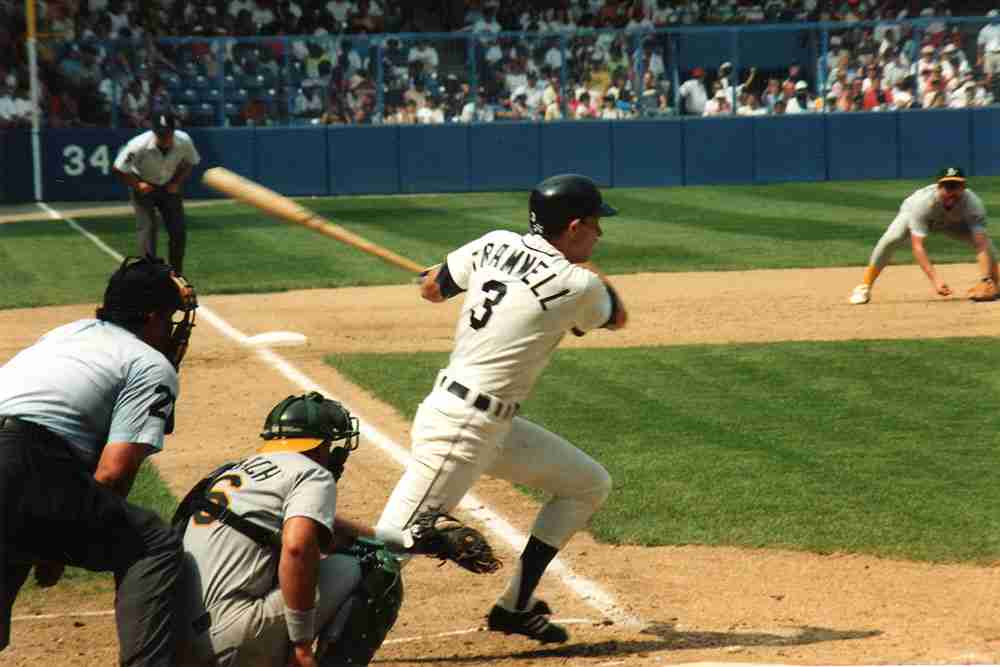
This is the twenty-third of our series where we here at Notinhalloffame.com, do what else? Debate the merit of twenty-four men on the most loaded Baseball Hall of Fame ballot in our lifetime.
Joining me, the site's Committee Chairman, in this debate are D.K. of the site's Phillies Archivist blog and Darryl Tahirali of the site's DDT's Pop Flies blog. This looks to be a very important part of our site, and we hope you will enjoy reading this as much as we enjoyed writing it.
Chairman: Alan Trammellis here on his fourteenth ballot, and based on the voting we have seen thus far, he will be on the ballot next year, fail, and have to look for a Veteran’s Committee induction. Trammell’s high water mark for voting was 36.8% two years ago and dropped back to 20.8% last year. I think we can all we agree that he is not getting in this year. What I want to ask both of you is should he.
D.K.: Alan Trammell is someone who has never really captured my imagination as being a potential Hall Of Famer. When he came up to the Tigers in 1977 (cup of coffee) & 1978 (first full season). I think his fielding skills were a little raw, but he worked on that aspect of the game and by the early or mid-1980s he was as smooth at that position as any active MLB shortstop. He would wind up winning four Gold Gloves.
While he’s not a favorite of mine I’d have to say that he has better stats than a lot of HOF middle infielders. With over 2,300 hits, a career batting average of .285 that includes seven .300 seasons, 1003 RBI, and 185 home runs, he probably ranks somewhere in the middle of the pack among shortstops who are currently in the Hall of Fame.
Darryl: Actually, DK, according to Jay Jaffe's WAR Score system (JAWS), Alan Trammell ranks 11th all-time among all shortstops and 8th all-time among the 21 shortstops already in the Hall of Fame; he is even ranked just ahead of Derek Jeter by JAWS although Jeter's total WAR value is about one and half wins better than Trammell's. None of which matters because the writers are not going to elect Trammell this year or next year, which will be his final year, and his fate is in the hands of a future Expansion Era Committee. So, Chairman, to answer your question: Yes, Alan Trammell is a Hall of Fame shortstop. He is better than shortstops Joe Tinker, Dave Bancroft, Hughie Jennings, Travis Jackson, Phil Rizzuto, and Rabbit Maranville, all of whom are already in the Hall of Fame.
Chairman: My thinking is more with Darryl on this one. I always thought he was one of the better Shortstops of all time, and maybe there is a bit of bias because when I first really to understand baseball, I was twelve years old and that was that dominant team Tigers team that won the World Series in 1984. Take Cal Ripken out of the picture (or let’s say he played third), Trammell adds a few All Star Games, and he might already be in as the consensus top Shortstop in the AL over that time period. Hell, we might be arguing Tony Fernandez instead!
I’ll say this, which is completely irrelevant. Somewhere around that time Trammell and Lou Whitaker also appeared on Magnum P.I., which also adds to the pop culture love for me…and yes that stuff matters far more to me than it should be.
Randomness aside, it looks like the Veteran Committee will have Trammell (and perhaps Lou Whitaker) on future ballot, and maybe he will get a shot then, because it won’t happen here.
D.K.: Alan Trammel’s candidacy evokes the question: Is there one Hall of Fame offensive standard for all players, or should voters follow separate standards for each position. Going by the former standard Trammel wouldn’t have much of a shot, but he becomes a valid, even a strong candidate if you judge him simply by how he’s performed compared to other shortstops. Defensively his reputation is solid and he’s bagged a quarry of Gold Glove Awards, but let’s examine his results as a hitter.
Trammel hit a solid .285 lifetime and enjoyed seven .300 seasons. He’d hit 12 to 15 home runs typically in his peak years, but reached 20 home runs twice, including a career high 28 one year. His final career total was 185 home runs. He’d drive in 60 to 75 runs just about every year in an eleven year peak period of 1980 to 1990. He finished with 1,003 ribbys.
He’d average better than a hit per game over his 20 year career that ended in 1996, with 2365 hits in 2293 games.
He had one off the charts season in 1987 where he and Darrell Evans led the Tigers to an A.L. East championship. Trammel’s numbers that year were 28 home runs, 105 RBI this only 100 RBI season) and a .343 batting average - all career bests! He wasn’t able to maintain that pace, but he did add three more .300 seasons after ‘87.
In a typical election year Trammel probably gets my vote, because his numbers are better than most HOF shortstops. This year however, is anything but typical and I can see four or five candidates being elected come January 6. It’s an awfully strong field and Trammel probably won’t make it into most writers’ top ten - the maximum number of candidates each writer can vote for. He falls short of my top ten as well. That doesn’t mean that I don’t support his HOF candidacy in the long run, however.
If the logjam of candidates is eased by the election of a number of players this year then Trammel will have my vote in the 2016 election, his final year on the writers ballot. My guess is that Trammel will make it to the Hall of Fame by way of the Veterans Committee in the not-too-distant future.
Darryl: D.K., I would hope that voters are considering positional scarcity in their selections, and I think that they have been, even historically. Ray Schalk, albeit a veterans committee selection in 1955, was voted in based overwhelmingly on his defensive play as a catcher. (Schalk has the dubious distinction of having an on-base percentage higher than his slugging percentage, .340 to .316, and although I'm too lazy to look it up, I suspect that Schalk's 11 home runs are the fewest hit by a position player in the Hall of Fame. But I digress. More relevant to our discussion here, shortstops Rabbit
Maranville and Ozzie Smith were both voted in by the writers, and both are much better known for their defensive abilities rather than their offensive ones; their respective elections may indicate the evolution of thinking: Maranville was elected on his final ballot in 1954 while Ozzie was a first-ballot inductee in 2002. I swear I've read somewhere recently that if Alan Trammell could have done backflips, he'd already be in the Hall. So, I'm saying it again.
As for Lou Whitaker, I noted his unfair one-and-done in my very first column for the site. He and Bobby Grich are two second basemen who deserve a strong second look. And if there is any justice in a future Expansion Era Committee, both Trammell and Whitaker will be elected in the same year.
Chairman: I want to vote for Alan, but in this ballot I have to say no. I hope he gets a real fair look from the Veterans Committee.
D.K.: Tied for 15th with Don Mattingly - and like Mattingly his HOF fate will soon be decided by the Veterans Committee. For Trammel and Mattingly to be elected in the future it will take a more enlightened group of voters than the vets committee that just rejected Minoso, Hodges, Oliva, Kaat, Wills and Allen last week.
Darryl: No. Alan Trammell is a SABR darling who does not have the Hall of Fame aura. I think he belongs in the Hall, but this is triage time--we need to clear the ballot by electing viable candidates. I hate to put so callously, but you don't water a dying flower. Trammell's viability on this ballot is as healthy as an orchid in the middle of the Sahara. May the Expansion Era Committee who gets to vote him in do so swiftly and mercifully, but the writers ain't gonna do it. Damn.
The Sammy Sosa Debate: 2015
Dec 29, 2014
Written by
Committee Chairman
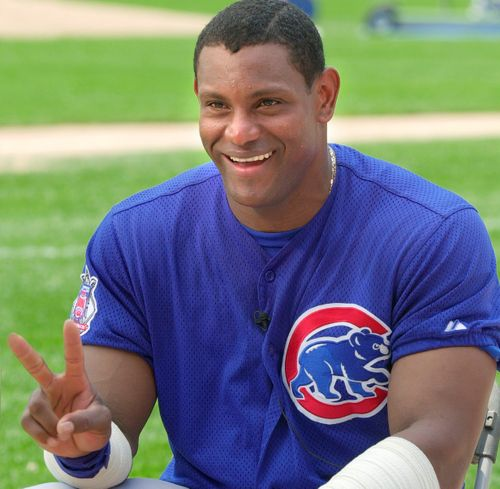
This is the twenty-second of our series where we here at Notinhalloffame.com, do what else? Debate the merit of twenty-four men on the most loaded Baseball Hall of Fame ballot in our lifetime.
Joining me, the site's Committee Chairman, in this debate are D.K. of the site's Phillies Archivist blog and Darryl Tahirali of the site's DDT's Pop Flies blog. This looks to be a very important part of our site, and we hope you will enjoy reading this as much as we enjoyed writing it.
Chairman: I think I want to coin a verb: Palmeiro. As in Sammy Sosa is in his third year of eligibility slumping to only 7.5% last year who is about to be “Palmeiroed” off of the ballot despite having great numbers though associated with a syringe. How about another verb: Sosa. As in my bilingual friend travelled to Mexico but was “Sosaing” so that he could pretend not understand Spanish. Seriously, I remember his complete lack of English recall on Congress more than any of the 600 plus Home Runs he hit.
D.K.: With his charging out to the field to start games at Wrigley field and his throwing cups of water in his face he was a more entertaining version of Mark McGwire and he probably share McGwire's fate of being ignored by writers.
His 609 career home runs is a HOF-like number, but at what point did he start using PEDs and how much did they help his career. Sammy pleads “No intende Ingles” on that one.
Darryl: Sammy Sosa is the only man in major-league history to hit 60 or more home runs in a season three times, and yet he never led his league in home runs in those seasons. That seems to sum up Sosa's career: Splashy highlights that ultimately appear less consequential than they seemed initially. Chairman and DK, you think of Sosa and think of "I no speaka da Ingles." When I think of Sosa, I think of him striking out with runners on base early in a Cubs game, trying to knock a three-run homer, and then hitting a solo homer later in the game, when it is inconsequential, with Sosa hopping out of the batter's box in his self-aggrandizing manner, having now hit a home run that makes his individual numbers look good but doesn't help his team. It is that as much as the PEDs allegations that makes Sosa's numbers look cheap.
Chairman: Perfect synopsis Darryl. Sammy Sosa is the “Big Empty”. His hollow stats are matched by that hollow character. There were a few within the media who were saying for years that Sosa was a great guy when the lights were on, but an asshole once the lights were off. I know we talked about character not mattering, but I always remember what was reported by multiple sources upon Sosa’s demise in Chicago. He was always playing his stereo loud in the clubhouse to the point where it dominated the audio under Wrigley. On that final day as a Cub when he bailed early (later denying yet proven to do so by videotape) a Cubs player took a baseball bat to that stereo. As we know, Sammy was an Oriole the year after.
This is where I feel character does matter on a ledger. Sammy was not a team guy and was an individual statistical slut. I will never question his talent, but his ethics. Give me a Bonds or a Sheffield over this guy any day. You will never have to guess where you stand.
D.K.: It’s been almost a decade since the public watched that news clip of
Sammy Sosa feigning that he didn’t understand questions directed at him by
congressmen back in March 2005.
One thing it showed was that Sosa could be dishonest when it suited his purposes - and that almost certainly extended to PED use over a prolonged period of time to give him an unfair advantage over his contemporaries.
I still applauded his accomplishments when he was already under suspicion and in one instance I even forgave him temporarily and rejoiced when I saw him hit his 600th home run live - courtesy of ESPN. This was long after his congressional fiasco. He still had that winning personality that made you want to be in his corner.
Some journalists have speculated that one day there will be a relenting on the part of the writers who withhold votes from Sosa and the rest of the PED crowd. The key word in that sentence is “Speculated or its root Speculation”. This may occur decades from now, but it’s not going to help Sosa in 2015 and he might even fail to snare 5% of the vote causing him to slide right off the ballot. In that event, as long as Sosa is not disqualified and banned by MLB his career could be similar to another Chicago legend, Billy Pierce. The great little lefty only lasted a couple of years before the writers before not getting enough votes to stay on the ballot. This didn’t exclude him, however from future Veterans Committee consideration and he was a final ten candidate at the Golden Era election earlier this month. Decades from now, Sosa may be in the same situation with his candidacy brought back from the dead and a new generation of writers, historians and even players that make up a future Veterans Committee in a more forgiving mood than the voting writers of present-day America. That will be his only remaining chance at Cooperstown should he fail to get 5% of the votes a few weeks from now.
Darryl: I remember when Sosa "docked a day's pay" for skipping work, and the penalty amounted to something like $80,000. That is more than most of us make in year. Sammy Sosa has become the poster boy for something that the anti-PEDs crusaders are trying to get at, and that is this: Is it possible for a player to put up Hall of Fame numbers but not be a Hall of Famer? The PEDs issue makes that easy because you can say the numbers are artificially inflated through cheating (although near-comparable numbers were put up by players thought to be clean, so there is more it than that), and I realize that if you lean too heavily on the "sportsmanship" and "integrity" aspects of the eligibility statement that you start to veer into "Hall of Morality" territory, but the more I write about Sosa, the harder it is to claim that he is a Hall-worthy player.
Chairman: I am voting no. Can someone translate that to Sammy please?
D.K.: He was charismatic and entertaining, but for many of the same reasons I couldn’t vote for McGwire I can’t vote for Sosa. - NO.
Darryl: No.
The John Smoltz Debate: 2015
Dec 29, 2014
Written by
Committee Chairman
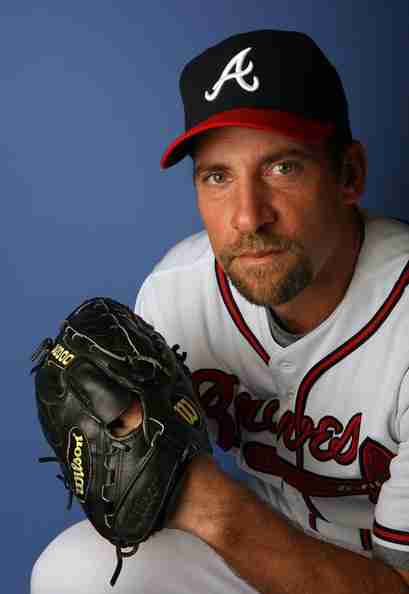
This is the twenty-first of our series where we here at Notinhalloffame.com, do what else? Debate the merit of twenty-four men on the most loaded Baseball Hall of Fame ballot in our lifetime.
Joining me, the site's Committee Chairman, in this debate are D.K. of the site's Phillies Archivist blog and Darryl Tahirali of the site's DDT's Pop Flies blog. This looks to be a very important part of our site, and we hope you will enjoy reading this as much as we enjoyed writing it.
Chairman: I know that I keep equating last year’s Maddux/Glavine & Thomas to this year’s Randy/Pedro & Smoltz but it seems so much of a given that two of them are going in (Randy Johnson & Pedro Martinez) and John Smoltz, while great is arguably a level below, and not necessarily a first ballot. I think the biggest comparison has to be Dennis Eckersley who got in on the first ballot, and had successful stints both as a starter and a reliever and they have similar bWARs (Eckersley 62.5 – Smoltz 66.5) but for John to replicate Eck’s 83.2% in his first year is so much harder as the man with the feathered coif did not have this kind of competition.
For the record, I far prefer the career of Smoltz and do feel his a Hall of Fame inductee; I just don’t know whether he would get in right away like Eckersley.
D.K.: I’d have to think that Smoltz is so highly respected by his peers and team beat writers that at worst John Smoltz will be a near-miss for election this year with over 2/3 of the writers casting their ballots for him and he might even get elected in his first year of eligibility.
While his victory total of about 220 wins is not that staggering, Smoltz struck out more than 3,000 batters and helped anchor an Atlanta Braves pitching rotation that was vital towards the team’s drive to a record-setting 14 straight division championships. He also made an unselfish switch to the bullpen for a few seasons where he notched more than 150 Saves.
Outstanding qualifications! The only thing that may prevent his election next month is that some writers hold first year eligible candidates to a higher standard than others.
Darryl: John Smoltz and Dennis Eckersley are the only pitchers in major league history to combine 150 wins and 150 saves, while Smoltz is the only one to combine 200 wins and 150 saves, although Eckersley finished three wins shy of 200 and he was a full-time reliever for 12 seasons to Smoltz's three, and Smoltz's period as a closer coincided with higher save totals in the majors as managers brought in the closer in any save situation. In 2011, I labeled Smoltz a "no-brainer" Hall of Famer who will most likely go in on the first ballot.
Frankly, and even though I called him another "no-brainer," I wasn't sure that Tom Glavine was going to be elected last year on his first try. He was, and maybe it was the vestige of the 300-game winner, which Smoltz does not enjoy, and we'll see whether Smoltz's detour into relief pitching will help or hurt him. But I also suspect that part of Glavine's appeal was that he was a pitcher in the Steroids Era, a clean player, and a part of so many winning Braves' teams. Smoltz has that too, and something else besides—he may benefit from a "complete the set" mentality that wants to put him in with Glavine and Greg Maddux with no delays.
Chairman: So we all see Smoltz as a Hall of Fame entry, and we all think he will get into the Hall immediately. Yet, here I am putting that word in italics. Could he somehow slip to next year? For the longest time I thought that it was possible and I thought of all the reasons why it could happen, so much to the point where I convinced myself they would make him wait a year.
Today I was also thinking about how Smoltz has now become a broadcaster, basically crossing over to media. I am not saying that he is politicking for votes, but he is in a position where he crossed over somewhat to “part of us” mentality that the writers might like. What am I saying here? I am saying that the imaginary fence I had him on, or thought he might be on, I am convinced what side he will fall; and I am totally cool with that, and yes I mean that as a first ballot induction.
D.K: I think it’s going to be close, but Smoltz might come up a little short this year. He won 20 games only once and people tend to generalize that he “unselfishly went to the bullpen for a few years to help his team”. Actually he had an injury that caused him to miss the entire 2000 season. Then when he had recuperated enough he rejoined the team in 2001 and went to the bullpen to build up arm strength to help his team”. He worked out of the pen so well manager Bobby Cox kept him there, because he’s discovered a gem in Smoltz’s work as a Closer. The move became semi-permanent and he didn’t return to starting until 2005. That cost him a significant number of career wins, but it also made him an attractive candidate as a rare pitcher who could excel both out of the rotation and out of the bullpen.
213 wins, 154 Saves and 3,084 Saves mark Smoltz as one of the toughest pitchers to face of his era but he’ll be competing against 303 game winner and #2 all-time in strikeouts in Randy Johnson who also had a higher winning percentage than Smoltz, Pedro Martinez another 3,000 strikeouts pitcher with the second highest winning percentage of any 200 game winner, plus holdover Curt Schilling whose numbers are very similar to Smoltz’s in wins, win percentage and strikeouts. Smoltz will be a Hall of Famer soon, although perhaps not this year.
Darryl: I don't know that the move to broadcasting will be that big of a factor, although as I watch him on MLB Network that does cross my mind occasionally. I think the bigger factor is that he is the third of the Braves' starting-pitcher trio, and with both Maddux and Glavine being voted it last year, it may be a "complete the set" mentality to vote for him this year, as I mentioned previously. Given the ballot logjam, I would not mind seeing him not be voted in this year, but I would hate to see a poor showing. And although I've stated repeatedly that I don't go for the contingency approach that "Player A may be a Hall of Famer, but Player B needs to go in first," it would rankle me if Smoltz gets elected this year while Curt Schilling does not.
Chairman: Easy one for me here. A definite yes.
D.K.: I ranked him at #8. - YES.
Darryl: No. Not this year. I think he is a Hall of Famer, and I think that he will get a lot of support. However, I do not think he is "inner circle" enough to leapfrog over candidates just as deserving as he is who have been on the ballot previously. Randy Johnson and Pedro Martinez, yes. John Smoltz, no. Not this year.
The Lee Smith Debate: 2015
Dec 29, 2014
Written by
Committee Chairman
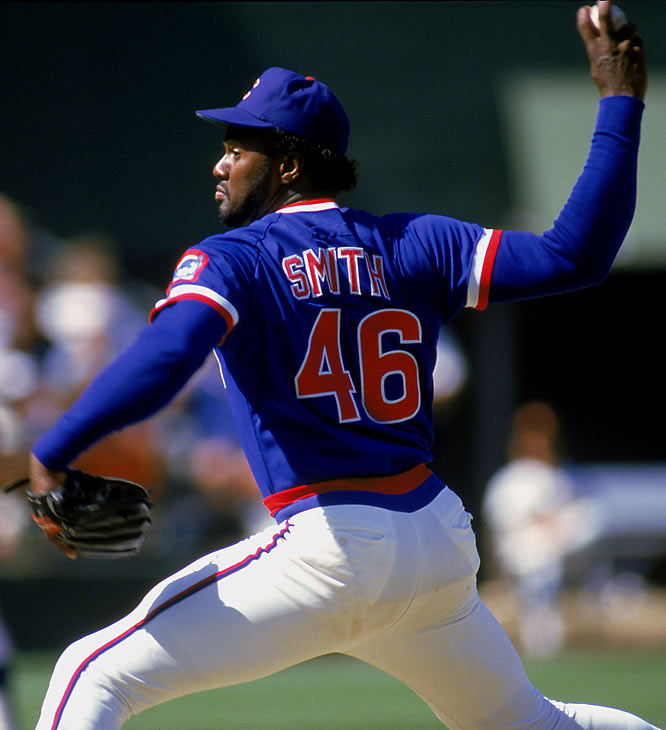
This is the twenteth of our series where we here at Notinhalloffame.com, do what else? Debate the merit of twenty-four men on the most loaded Baseball Hall of Fame ballot in our lifetime.
Joining me, the site's Committee Chairman, in this debate are D.K. of the site's Phillies Archivist blog and Darryl Tahirali of the site's DDT's Pop Flies blog. This looks to be a very important part of our site, and we hope you will enjoy reading this as much as we enjoyed writing it.
Chairman: I don’t know about the two of you, but my biggest turn around over the past ten years has been on Lee Smith, and not for the better. I was all in on respect for closers and I was taken in by the 478 Saves (retiring with the all time Saves record) and four Saves Titles. This is still an accomplishment to celebrate, but when compared to a true dominating closer like Mariano Rivera, he doesn’t come close. Forgetting the Saves, we have Rivera’s 1.000 WHIP to Smith’s 1.242, Rivera’s 205 ERA+ to Smith’s 132, and a bWAR of 56.6 to Smith’s 29.4. I haven’t even talked about how he shit the bed in his two playoff appearances. What was I thinking?
Perhaps the writers are thinking the same as this is Lee Smith’s 13th year and like so many others here, he hit his low last year with a 29.9%, down from 50.6 two years ago. I don’t think it is looking good for Mr. Smith.
D.K.: Lee Smith’s case for the Hall of Fame brings up an interesting topic. Should someone who once led a sport in a statistical category be a Hall Of famer if that record has been surpassed or even obliterated? Smith’s 486 Saves was the record for at least a decade until that total was surpassed by Trevor Hoffman and Mariano Rivera.
Well you could say that before Babe Ruth came to prominence a guy named Gavvy Cravath was the all-time home run leader. No one brings his name up for the Hall of Fame in the Pre integration (1871-1945) category. The same is true for other sports:
In the NFL Philadelphia Eagles 1950s and 1960s receiver/kicker, Bobby Walston was once the NFLs all-time leader in Scoring and Billy Howton another star of the 1950s and early ‘560s was briefly the all-time pass receiving record holder with 503 catches.
Today, however these NFL stars accomplishments have pretty much been forgotten. Smith is likely to receive the same treatment from writers as sportswriters have given Cravath, Walston and Howton in the past.
To add to the gloom of Smith’s case you have to note that he finished his career 21 games below .500 (71-92), had a significant number of blown Saves (103) and led the league as often in Blown Saves as he did in Saves (four times in each category).
Darryl: D.K. brings up a good point about pioneers who have since been surpassed, and Lee Smith I think is the prototype of the "one-inning closer." As such, he falls between two stools: One stool has the "firemen" from the previous eras—Hoyt Wilhelm, Rollie Fingers, Goose Gossage, Bruce Sutter—the relievers who stepped in to quell the rally and stayed in to finish the game, and the other stool has the lights-out closers who followed Smith including Dennis Eckersley (although technically Eckersley's career began before Smith's, Eck was a starter until 1987), Trevor Hoffman, Mariano Rivera—and Billy Wagner, who I think has a legitimate Hall case, but that is for another time. Smith may have blown 103 saves, but his .823 save percentage is still better than the four Hall of Fame relievers I just named.
And although the Chairman thinks the newly-instituted 10-year rule for ballot appearances is a conspiracy theory to eliminate the PEDs candidates, I think it is also to slough off clean guys like Smith, who have hung around year after year but who are stalled at a voting plateau and show only negative movement. In other words, in each of more than ten ballot appearances, Lee Smith has simply not been impressive enough to garner the three-fourths needed for election. And there is a very good reason why: Lee Smith was very good but not elite.
Chairman: D.K., I like your analogy about holding an all-time major statistical category for over a year as a huge deal, and one that should be celebrated, but I personally don’t view the Save as a major stat anymore, and I don’t see it anywhere near as important as a Home Run. A Home Run is not ambiguous, a Save can be obtained so many ways, and you frankly have a lousy two thirds of an inning, let in a run and allow three people on base, and still get a Save.
At the end of the day, I just don’t see Lee Smith as an elite guy, just like Darryl states. We have seen some relievers change the game; and Lee just isn’t that guy.
D.K.: If part of the reason that Lee Smith dropped from around 50% of the vote to about30% was because of the competition heating up with three first time eligibleMaddux, Glavine and Thomas reaching the Hall, then things won’t get any easier forhim this year. Something tells me that the writers will definitely put Craig Biggio over the top after his near-miss last year. Then you have Randy Johnson, John Smoltzand Pedro Martinez becoming eligible this year and with those factors plus the 10vote maximum per writer and you can see how lesser candidates like Smith could getsqueezed out.
After the rule change was adopted limiting new candidates to 10 years on the
ballot, Smith will be the last candidate to get a full 15-year run on the ballot, ending in 2017. The extra years probably won’t help him much.
Darryl: Good point, Chairman, and not to put too fine a point on it, but while the game did change during Smith's tenure, to an interventionist bullpen capped by the one-inning closer, it was an institutional change and not as a result of Smith's impact. He was merely an instrument used for that change and not the catalyst for that change.
Chairman: Here is where I like the extra time to think about it. If I had a vote seven years ago, I would have said yes. I would have been wrong, and I vote no.
D.K.: NOPE
Darryl: No.
The Gary Sheffield Debate: 2015
Dec 28, 2014
Written by
Committee Chairman
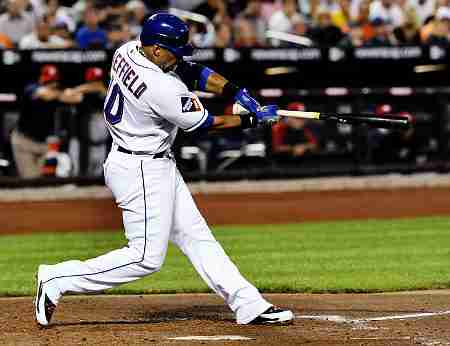
This is the nineteenth of our series where we here at Notinhalloffame.com, do what else? Debate the merit of twenty-four men on the most loaded Baseball Hall of Fame ballot in our lifetime.
Joining me, the site's Committee Chairman, in this debate are D.K. of the site's Phillies Archivist blog and Darryl Tahirali of the site's DDT's Pop Flies blog. This looks to be a very important part of our site, and we hope you will enjoy reading this as much as we enjoyed writing it.
Chairman: I forgot just how much Gary Sheffield accomplished. 9 All Star appearances, 509 Home Runs, a Batting Title, an OPS Title, 6 OPS seasons over 1.000, a 60.2 bWAR and a World Series Ring. Screams Hall of Fame right? Here we may have another Rafael Palmeiro (without the wagging finger to congress) but with a more surly attitude. Here is another difference; I wouldn’t be surprised to see Sheffield hang on the ballot another two years like Raffy did.
D.K.: Sheffield was sort of a Dick Allen with better numbers and more career longevity. While 509 home runs is great to put on his HOF resume, like Allen he was one of the more divisive players in any MLB dugout, any time, any place. Love him or hate him one thing was certain - and Sheff could care less. Yankees beat writers circa 2004-2005 and media found him to be a clubhouse cancer. Things were never harmonious with Sheff around. He sometimes seemed to be more interested in proving what a BADASS he was than in winning games.
It’s interesting that now in retirement he’s putting up a lot of his own money to build a baseball stadium and instructional baseball camp in Pasco County, Florida (just North of Tampa/St. Pete/Clearwater) to teach the game properly and to develop some future major leaguers. If this kinder, gentler edition of Sheff had been present during his playing days then he’d have a lot easier time in securing writers’ votes to put him into the Hall of Fame.
Darryl: The Dick Allen comparison is good, but Gary Sheffield has always reminded me more of Dave Winfield. Both have reached Cooperstown milestones—Sheffield with 500-plus home runs, and Winfield with 3000-plus hits—both were excellent hitters for whom you put up with their deficient defensive skills (although, surprisingly, Winfield was a designated hitter just over 400 times in a nearly 3000-game career, while Sheffield DH'ed about 300 times in more than 2500 games), and although neither was the superstar in the lineup, you didn't want either one to beat you—because each could.
But, gentlemen, let's make explicit what the Chairman alluded to: performance-enhancing drugs. Sheffield was named in the Mitchell Report as having received PEDs from the Bay Area Laboratory Cooperative, and the BALCO scandal has been the biggest bugbear to Barry Bonds—with whom
Sheffield is associated as he worked out with Bonds in 2001, during which time Sheffield's trainer applied "the clear," a topical application reputedly containing steroids and obtained from BALCO, to Sheffield. Chairman, you may be right about Sheffield hanging on, then disappearing, as did Rafael Palmeiro. In any case, on an overcrowded ballot with a PEDs taint hanging all over him, Gary Sheffield, whom I think is definitely borderline, won't need to book a flight to Cooperstown anytime soon except as an onlooker.
Chairman: I hate to use the likability card, as I completely agree with you Darryl that this should have absolutely no merit as to whether a candidate gets in or not, but there is always that human element. The baseball writers have met a lot of these guys and there is no doubt in my mind that many of them have held grudges against certain people and refused to vote for them.
With Sheffield, this is a guy who ruffled more feathers than Barry Bonds did, and while his numbers are Hall of Fame worthy, they are not Play Station numbers like Bonds. I only bring this up to add a little fuel to the potential one and done of Sheffield on the ballot. If you were a writer torn between Sheffield and let’s say for argument sake Mike Mussina as the tenth guy you would pick, maybe you go with the guy who didn’t blow you off for an interview.
Again, that should never be a factor, but it’s like why I keep my mouth shut at the airport; I am not giving anyone with power over me for that brief period of time a reason to use it.
D.K.: One and done, Darryl? - I don’t think it’s going to play out that way, but who knows how the voters will treat Sheff his first ballot? My guess is he’ll get closer to 25% of the votes than 5% and that he may be stuck in that neighborhood for years to come.
Darryl: Yes, I can see that if it came down to choosing between two candidates, and you know both of them, and one of them has been more of a jerk than the other, how you might vote for the nicer guy. Writers are only human, after all. I think Sheffield may play out more like Mark McGwire: Career numbers on the bubble and a PEDs taint although not of the finger-wagging hubris of Rafael Palmeiro. He may survive for several years with percentages in the 20s and 30s.
Chairman: I think Sheff is going to get “Palmeiro’d”, but in other years he would get my vote. Here, I have to pass. Just too much competition, and I vote no.
Darryl: No.
D.K.: He probably hurt his teams with his attitude as much as he helped them with his talents. - NO.
The Curt Schilling Debate: 2015
Dec 27, 2014
Written by
Committee Chairman
This is the eighteenth of our series where we here at Notinhalloffame.com, do what else? Debate the merit of twenty-four men on the most loaded Baseball Hall of Fame ballot in our lifetime.
The Tim Raines Debate: 2015
Dec 28, 2014
Written by
Committee Chairman
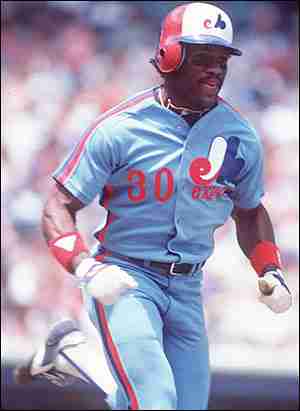
This is the seventeenth of our series where we here at Notinhalloffame.com, do what else? Debate the merit of twenty-four men on the most loaded Baseball Hall of Fame ballot in our lifetime.
Joining me, the site's Committee Chairman, in this debate are D.K. of the site's Phillies Archivist blog and Darryl Tahirali of the site's DDT's Pop Flies blog. This looks to be a very important part of our site, and we hope you will enjoy reading this as much as we enjoyed writing it.
Chairman: For the record I have always loved Tim Raines and wanted to throttle anyone who ever called him a poor man’s Rickey Henderson. Although I grant that Henderson had the more impressive career, Raines had one hell of a run, and was overshadowed by a better base stealer. “The Rock” enters his eighth nomination and with the reduction from fifteen years to ten years on the ballot has potential to be the biggest victim from the change.
Raines had 46.1% last year, which is down from finally hitting the 50% mark last year. Gentlemen, if Raines was on for fifteen years, I would bet my house that he would get inducted but in ten years? I am keeping my deed to the property.
Darryl: You'll have to throttle me, then, because I've been calling Tim Raines the poor man's Rickey Henderson for some time now. On the other hand, I've been calling Kenny Loftonthe poor man's Tim Raines, and he was criminally a one-and-done two years ago.
But here's my Raines story: Years ago, I was in a technical writing certification program, and one report-writing course I took included feasibility reports. I did mine on a fictitious Hall of Fame "Underdog Committee" that looked at bubble candidates who would be retiring soon. I picked Raines, Edgar Martinez, Fred McGriff, and—don't laugh—Andres Galarraga (hey, he looked pretty good back then), and had to evaluate them and pick one to recommend. I went in figuring I'd pick Martinez, but after evaluating them, I picked Raines as the best (most feasible) candidate. Funny how that worked out on the real ballots years later, yes? But you're right—I was pretty sure after last year that Raines would struggle on the ballot, and that'll be even more so now. Some Expansion Era Committee is going to have to fight to get him in the Hall.
D.K.: If you think of the Hall Of Fame as the greatest team of players ever assembled then you’re going to need every component of a great team, including you’re speed guys and table setters. With 808 stolen bases and a career .294 hitter hardly any player has filled the bill for that role better than Raines since the late 1970’s except Rickey Henderson. Lou Brock, Henderson and Raines posted career totals not seen since the dead ball era days when running was a most critical and necessary part of the game.
His seasons of .320, .334 where he led the National League in ‘86 and .330 is a pretty nice career peak that he reached between 1985 and 1987. He finished his career with 2,605 hits and better than a hit per game average and he reached 70 stolen bases six consecutive years (1981-1986), taking four NL stolen base titles, and reaching a career high of 90 SB in 1983.
A veteran of 2502 games in 23 years he had tremendous longevity also. With his vote totals of about 50% the last two elections, he’s been a bit underappreciated so far by the writers. I’ll be very interested to see if Raines vote total makes some progress towards election, come January 6th.
Chairman: So let’s call him a rich man’s Maury Wills then? If Maury can get solid Veteran’s support, maybe there is a hope for Raines that way, as I have a strong suspicion he will see a percentage decrease again this year, and he is not going to get in by “traditional means”.
“The Rock” (and is that because of what he liked smoking the best?) has to consider it a win just to get back to where he was two years ago. I wonder if the Expos deal hinders him a bit. I know that his teammates Gary Carter and Andre Dawson got in, but Carter had a couple good years with the Mets and was just one of those guys that people loved. Dawson had the MVP season with the Cubs, and many people associate “the Hawk” with Chicago more than Montreal. Raines never had a signature season outside of Montreal. Am I reaching or am I bordering on another conspiracy theory here?
D.K.: Although the writers have asked the HOF if they may increase the maximum number of players they can vote for in any election to 12. As far as I know, if 12 votes is approved per writer it won’t go into effect for the election at hand. Even with only 10 votes I’ll fit “The Rich Man’s Maury Wills (Tim Raines) in there somewhere.
Darryl: Gary Carter and Andre Dawson may be good examples, and not just because they were also Expos. It took Carter six tries to be elected, and it took Dawson nine tries--and both did it in years that did not have the embarrassment of riches that Raines is facing now. Shhh! Everyone is trying to forget that Raines was one of several MLB players implicated in the Pittsburgh drug trials of the mid-1980s. Supposedly, Raines slid head-first into bases so he would not break the cocaine vial in his back pocket. But given the obvious punishment being meted out to the PEDs guys, you have to wonder whether some writers have not forgotten about Raines's involvement in this quiet, although significant, drug scandal in baseball.
Chairman: This breaks my heart because I think he is a Hall of Famer. He is my 11A candidate, but sadly my vote is no.
Darryl: This is my last speech. Probably. I've been calling Tim Raines a Hall of Famer since 2002. Yes, that was in his last year before retirement. I've been calling him that ever since. But based on his voting history, I don't think that he has a chance on the writers' ballot. My primary approach in this (hypothetical) vote is, with a few exceptions, to clear the ballot by voting for as many candidates who have a good chance of actually being elected and thus enable voters to more seriously consider candidates such as Raines, who is a SABR darling who does not have that Hall of Fame glow about him. (Spoiler alert: I'll be saying the same thing about Alan Trammell.)
Thus, it pains me to say it, but my vote is no. Not this year.
D.K.: Maybe it’s because I was small in stature in elementary school but I always appreciated baseball’s smaller, pesky, feisty little guys that batted lead off or #2 to set the table...the Richie Ashburns, Curt Floods, Lou Brocks , Luis Aparicios, Maury Wills, Ron Hunts, Pete Roses, Nellie Foxs and Ricky Hendersons of this world ....and Tim Raines. I see that I think much more highly of Tim than my colleagues. I ranked Raines as my #3 candidate and that results in an emphatic YES vote!
The Mike Piazza Debate: 2015
Dec 27, 2014
Written by
Committee Chairman
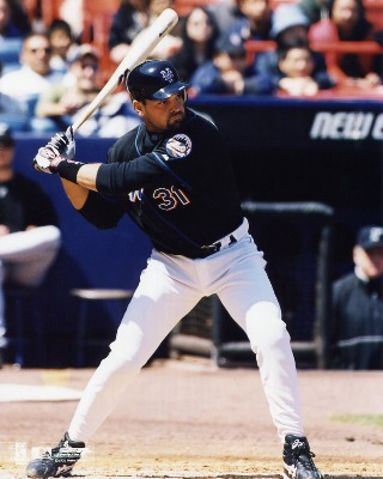
This is the sixteenth of our series where we here at Notinhalloffame.com, do what else? Debate the merit of twenty-four men on the most loaded Baseball Hall of Fame ballot in our lifetime.
Joining me, the site's Committee Chairman, in this debate are D.K. of the site's Phillies Archivist blog and Darryl Tahirali of the site's DDT's Pop Flies blog. This looks to be a very important part of our site, and we hope you will enjoy reading this as much as we enjoyed writing it.
Chairman: We talked about suspicion keeping Jeff Bagwell out so far, and the same has to be stated for Mike Piazza, who can make a statistical claim as the best offensive Catcher in the history of Baseball. There has been a bigger cloud over Piazza than Bagwell, though no positive tests or anything of that nature. With his credentials is there any reason to explain why Mike Piazza has not entered the Baseball Hall of Fame; however all is not lost. Piazza is on his third year of the ballot, and unlike others, his percentage has gone from 57.8% to 62.2%. He may not get in this year, but his chances look healthy.
Darryl: Considering that Mike Piazza did admit to using androstenedione
("andro," most notably associated with Mark McGwire) early in his career, his 2013 debut percentage of 57.8 is impressive, as is the fact that only Piazza and Craig Biggio saw their vote totals increase in 2014. Jeff Bagwell may not be a great comparison because Bagwell is competing against a number of other high-profile first basemen, but who has Piazza's competition at catcher been on his two ballots so far? Sandy Alomar, Jr.? Paul Lo Duca? And there is really no competition for him this year. Moreover, you are right: Piazza is the best-hitting catcher in history. What makes me optimistic is that he debuted at a high percentage and added more votes even with Greg Maddux, Tom Glavine, and Frank Thomas added to last year's ballot.
D.K.: Piazza’s future is looking up and his vote totals should increase as well. The only question is how far up will they go this year. Enough to get elected? We’ll see.
He hit 396 of his 429 career home runs as a catcher, which is better than any other catcher in history by a large margin. He could have hit over 400 home runs as a catcher, but he foolishly left the San Diego Padres and went to the Oakland Athletics for his final year where he was used exclusively as a designated hitter (when he wasn’t hurt - in an injury plagued final season.)
As a Phillies fan it bothers me that he grew up in the Philadelphia suburbs and with better scouting he could have been a career Phillie. Instead he was drafted by the Los Angeles Dodgers, and he made a name for himself with them and the Phillies’ divisional archrival, the New York Mets. Instead of having Piazza as their power-hitting backstop for a decade and a half from the early 1990s to the mid-2000s the Phillies had to settle for Mike Lieberthal.
Chairman: These are all outstanding points, and I forgot about that andro admission. For the record, I do think he was on PEDs, but like I have said multiple times before, those people get a pass before the official announcement from MLB, and I do have again state; he never flunked a test, so none of my matters anyway.
I went so glass if half empty with Piazza looking at what I thought was a low debut for him without comparing him to the Bonds of the world. He is heading in the right direction, which he should be. I think a small victory for him is to squeak in to that 65 to 67 range, which in my mind is the best he could hope for this year.
D.K.: Between 1994 and 1997 Piazza scorched the ball to the tune of a .342 four-year average. He hit no lower than .328 and had a career high of .362. To his predecessor, an all-star catcher, Mike Scoscia, Piazza was crooning, “Move Over Little dog, ’Cause the Big Dog’s movin’ in”. Piazza’s impact early in his career was considerable. He managed to hit .308 lifetime despite tailing of in his later years and he’s the all-time leader in home runs as a catcher. - Pretty indisputable qualifications. I’d vote for Piazza each and every year until he’s giving his induction speech.
Darryl: Agreed. As long as Piazza keeps adding to his vote, he will be elected in a couple of years. Of course, my wildly optimistic scenario is to see a 13 percent jump that pushes him across the threshold this year. Hey, a fan can dream, can't he?
Chairman: I will keep it simple. Yes.
Darryl: Equally simple. Yes.
D.K.: Even if he didn’t have the greatest throwing arm to nab base stealer
Piazza more than made up for it with his bat and is in fact arguably the best hitting Catcher in MLB history. I ranked him #4 this year. YES.
The Mike Mussina Debate: 2015
Dec 27, 2014
Written by
Committee Chairman
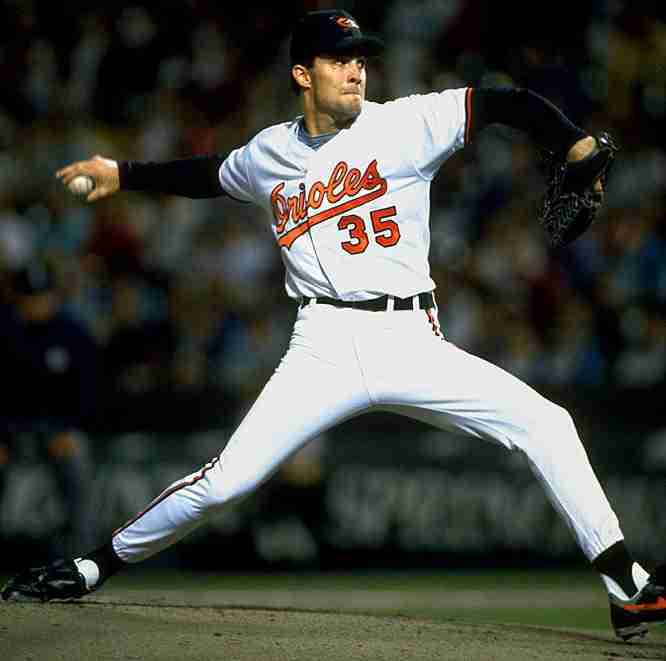
This is the fifteenth of our series where we here at Notinhalloffame.com, do what else? Debate the merit of twenty-four men on the most loaded Baseball Hall of Fame ballot in our lifetime.
Joining me, the site's Committee Chairman, in this debate are D.K. of the site's Phillies Archivist blog and Darryl Tahirali of the site's DDT's Pop Flies blog. This looks to be a very important part of our site, and we hope you will enjoy reading this as much as we enjoyed writing it.
Chairman: I went on record last year saying that the biggest shock to me was the paltry 20.3% he got on his first year of eligibility. I know he was “only” an All Star five times, but every stat points to this man as a Baseball Hall of Fame inductee. Personally, I think the biggest disaster that could happen is if Mike Mussina somehow fails in the ten years on the ballot to get into Cooperstown. It’s funny to me how someone who spent his entire career in the ballyhooed American League East, doesn’t have that cache name. We talked about the “Hall of Very Good”, and I think a lot of people want to automatically put Mussina there. He is better than that.
Darryl: I agree completely. In fact, three years ago, I wrote an article for the site in which I identified five "tough sell" Hall of Fame-caliber players, meaning that because of the ballot logjam they may get overlooked. Of course, one was Frank Thomas, and we saw how "overlooked" he was last year. On the other hand, the other four were Jeff Kent, Mike Piazza, Curt Schilling—and Mike Mussina. Moose may be a Bert Blyleven-type case in which the advanced stats will need to demonstrate how effective he was in tandem with his traditional stats. His 3.68 ERA may hurt a bit, but in that AL East he spent a lot of time with the Baltimore Orioles, which was a division doormat—and his FIP (fielding-independent ERA) is 3.57, meaning that he did a fair bit of heavy lifting and not his fielders. Mussina is better than a lot of pitchers already in the Hall—he won't cheapen the roster by any measure.
DK: Mussina’s not quite in the Pedro Martinez/Whitey Ford category in winning percentage, Whitey Ford, but who is? With his .638 winning% he’s closer to another current nominee, Randy Johnson and that’s plenty good enough company. Like Ford, who had just two 20-win seasons, which may surprise a lot of people, Mussina also is short in the 20 wins season category, winning 20 only once. He had a lot of Ford-like high win percentage seasons, however, going 18-5, 16-5, 19-9, 19-11, 18-7 17-8, 18-10 various years and other stellar seasons without reaching the 20 win mark.
I thought he might make a run for 300 wins, when he won 20 in 2008, but he was about 39 years and 10 months old when he go his 20th, for the only time in his career, in the Yankees 2008 season finale. Does that mean he didn’t have “the heart of a lion” to pursue 300, or that at nearly 40 he just considered himself done. Was he a good family man who just wanted to stay home after about 20 years on the road with his major and minor league teams or was he just a guy who wasn’t that driven by statistical goals. After all Al Kaline didn’t come back for one more season just because he was one home run below the 400 HR mark at the end of the 1974 season and Billy Pierce didn't cancel his retirement plans because he finished the 1964 season one strikeout below 2,000K - and no one holds that against them and doesn’t think they weren’t spectacular ballplayers.
Mussina’s 20% vote total last year was surprisingly low, but there have been others like Gary Carter who started small, but whose vote totals snowballed in the next few years afterwards towards eventual election by the BBWAA.
Chairman: So we all agree that Mussina is a Hall of Fame Pitcher, at least in our eyes. It is almost that he is in the wrong place at the wrong time with this vote; almost like his career in Baseball, as he was never on a championship Yankees team, which certainly would have helped; especially if he would have at least a signature post season performance, which he didn’t have.
I don’t know if you both saw the article that Buster Olney recently did where he stated he was abstaining from his vote to help a guy like Mike Mussina, a man he would vote for…if he had more than ten slots. Basically, he thinks by abstaining, he helps Mussina’s percentage, should others vote for him.
Now, I hate the idea of abstaining from a Hall of Fame vote, especially if this what some of the voters thinks it has come too but if anything illustrates the current logjam to get into Cooperstown better than this, I haven’t seen it.
D.K.: When I look at his career numbers I don’t find many numbers that are eye-popping, however, you see the picture of a very steady, consistent performer.
You might not think of him as a great strikeout pitcher, but Mussina didn’t fall too far short of being a 3,000 strikeout man, with 2813 Ks for his career. He never led the league in strikeouts but he topped 200Ks four seasons and he topped 170 Ks nine seasons. He was really consistent, but didn’t have the WOW FACTOR going for him of being the best pitcher in the majors at any time in his career.
With the absence of the WOW FACTOR, I think that Mussina fits the profile o someone who gets elected in their final one or two chances with the writers or fails short there and gets elected by the Veterans Committee.
Darryl: Chairman, I have not seen Buster Olney's article. Do you have a link or reference to it? I respect Olney's work and generally agree with his views. I admit that I am not a mathematician and would have to read his rationale, but I do not understand how abstaining from voting, and it sounds from your description that he is abstaining altogether because Mussina is not among his ten, would help Mussina. Again, I'm no math whiz, but it seems to me that the more votes cast for any player increases the chances for some candidates to be elected, and that removes them from the ballot and thus increases the chances for the remaining candidates in future years. Silly hypothetical: Say Olney planned to vote for Curt Schilling this year but abstains, and Schilling misses election by one vote. Olney's vote would have removed Schilling from the ballot by dint of election to the Hall--but now Schilling comes back on a future ballot, still siphoning support for Mussina. I don't get it.
DK, to your point about round numbers, we like them because they are convenient plateaus. To me, Mussina is a Hall of Famer without the 300 wins, and in any case, in his era of interventionist bullpens, 268 wins is 300 wins. Mussina had 43 "tough losses," losses in which he pitched a quality start (six or more innings pitched while allowing three or fewer earned runs), with 24 of those with Baltimore, and he had 40 wins lost (22 with Baltimore), games in which he had the lead when he left the game but his bullpen lost the lead and thus Mussina got a no-decision instead. (He had 113 of those altogether.) Somewhere in there are the 32 wins he needed for 300 games. Contrast that with Gus Wynn, who grimly hung on until his age-43 season to get to 300 wins in 1963, and his 1962 season, in which he fell one short of 300 wins, was really grim: 7-15 (.318), 4.46 ERA, 88 ERA+ (i.e., Wynn was a below-league-average pitcher). He returned in 1963, got his 300th win in his fourth start--on July 13, after not having pitched in his first game of the season until three weeks earlier--and pitched the minimum five innings necessary to be credited with a win. He started just one more game subsequently, getting a no-decision, while his 15 other appearances were as mop-up relief (he did earn one save). It was a desperate effort to reach a milestone, and watching Tim Wakefield labor to get to 200 wins a few years ago is probably a similar experience.
And now we get to the asinine premise of the Bernie Mac baseball movie
"Mr. 3000," in which Mac's character has three hits taken away from him by revisionist bookkeeping, and although he may have been a Hall of Famer at 3000 hits, he may not be at 2997 hits, and thus he suits up at age 47 to get back those three hits. Ugh! No! That's why I love Al Kaline's numbers. As you note, he did finish one home run shy of 400, and he was two doubles shy of 500 while his .297 batting average is three percentage points below .300. Now, had Kaline not played the 1974 season and thus passed the 3000-hit plateau with his 146 hits that season, would he have been a Hall of Famer with 2861 hits, 470 doubles, and 386 homers? Maybe not first-ballot, as he was in 1980 with more than 88 percent of the vote, but really?
Chairman: Darryl, here is the link to Olney’s reasoning. Anyway, for me Mussina gets on my ballot, but admittedly on the ten hole. I vote yes.
Darryl: Yes. Despite his paltry vote total last year, Mike Mussina is clean and is a no-doubt Hall of Famer. Get him off the ballot--and into Cooperstown.
D.K.: I can see why the writers asked that they be allowed to cast 12 votes instead of 10 this year. There’s simply too many good candidates right now. Even with an expanded ballot, however, Mussina still misses the cut. I ranked him #13. That’s a NO vote from me - not NO forever, but NO for this year with it’s crowded field.
The Mark McGwire Debate: 2015
Dec 26, 2014
Written by
Committee Chairman
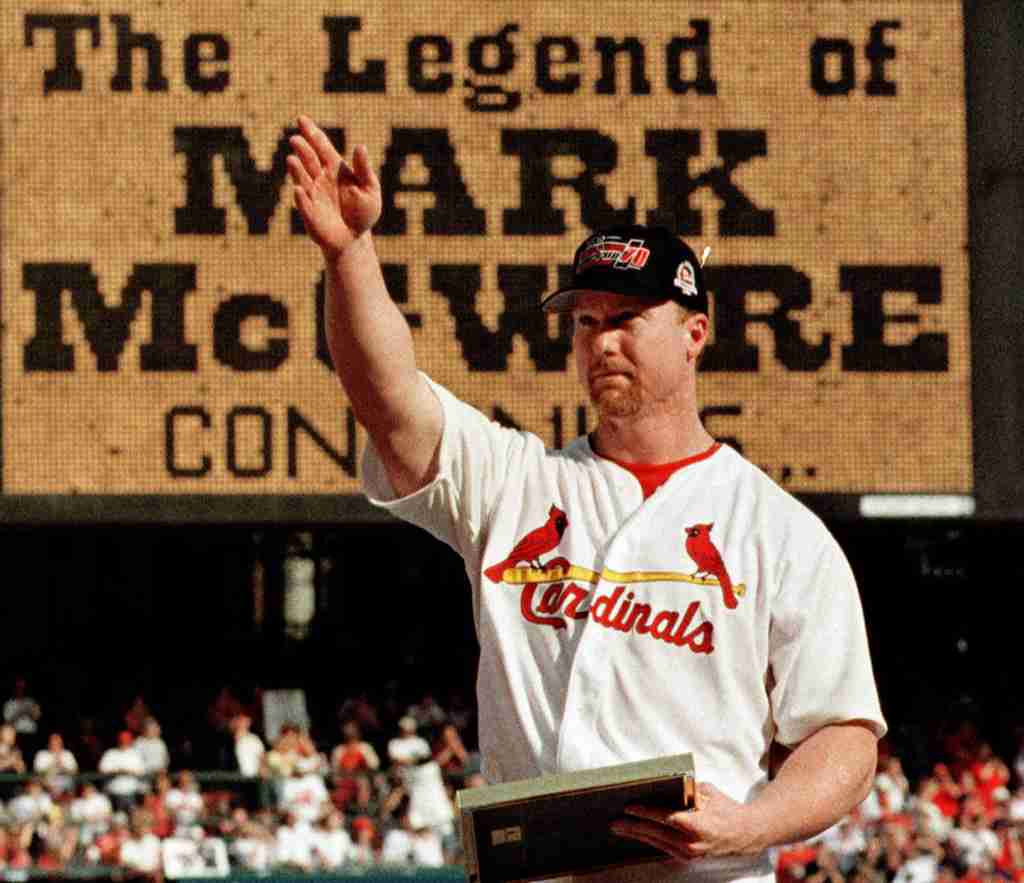
This is the fourteenth of our series where we here at Notinhalloffame.com, do what else? Debate the merit of twenty-four men on the most loaded Baseball Hall of Fame ballot in our lifetime.
Joining me, the site's Committee Chairman, in this debate are D.K. of the site's Phillies Archivist blog and Darryl Tahirali of the site's DDT's Pop Flies blog. This looks to be a very important part of our site, and we hope you will enjoy reading this as much as we enjoyed writing it.
Chairman: What, the PED discussion again? Actually, I am going to open with something a little different, as I have been a little surprised at just how much as his support has plummeted. This was the first “Steroids Guy” on the Ballot and here we are on year nine and the new ten year rule will kick him off in two years; and don’t think this isn’t by accident. Mark McGwire plummeted to eleven percent last year, but his fall shows me that contrition doesn’t mean anything to the writers. Nobody else apologized, and Big Mac has done pretty well for himself as a hitting coach in the Majors. So much for forgiveness.
Darryl: You and I differ on the intent of reducing the eligibility period. I think it is to reduce the logjam regardless of the perception of the player—Edgar Martinez, Tim Raines, and Alan Trammell are just as likely to fall off as the PEDs-suspected players. Mark McGwire was indeed the lightning rod, though, the first star with that PEDs association to hit the ballot. Regardless of what doping did to his performance, that performance is on the bubble—more peak dominance than longevity.
He was largely one-dimensional, a Three True Outcomes hitter—walk, strikeout, home run—but it was an awesome dimension. One thing that impresses me is that his on-base percentage of .394 is 131 points higher than his .263 batting average. He collected 1626 hits but walked 1317 times, and only 150 of those were intentional—but that's still 46th all-time. That's a feared hitter—and a selective one. Borderline, but he's like a Ralph Kiner: Essentially one tool, but it was a sledgehammer. Just barely a Hall of Famer—but I think at this point, a future Expansion Era Committee will have to debate that. And that is the ramification of the shortened eligibility period: Baseball is dumping responsibility for gatekeeping into the Hall on future committees.
D.K.: I think that a lot of the media that covered McGwire’s quest to surpass the single season total of Roger Maris back in 1998 felt like they’d been duped when it came out that McGwire wasn’t clean. These same writers are the ones who have withheld their vote for McGwire ever since he became eligible. Therefore I think McGwire’s chances for election are minimal.
Chairman: I stand by my conspiracy theories! We did not walk on the moon, there was another gunman and aliens built the pyramids in Egypt. Ok, bad jokes aside, we’ll agree to disagree on the motives, but you are right about equating McGwire to a one trick pony, though it was one equivalent in my eyes to Thornton Melon’s triple lindy (1% of future shares in the site to whoever gets that reference), but yes, taking away from PEDs it is a resume that puts you on the cusp of the Hall when looking at the bigger picture.
Saying that these future committees are going to be loaded with his generation’s “clean players”, so if McGwire and his friends are getting in, they have a better chance with the baseball writers, not with guys like Frank Thomas or Goose Gossage who have openly decried these guys shouldn’t be in, and could wind up on these future committees.
D.K.: The odd thing about Barry Bonds and McGwire is that they began using PEDs after they were already highly successful star players. Many have argued that if Bonds had left steroids alone he’d have made the Hall Of Fame anyway. McGwire wouldn’t have put up Hall Of Fame numbers, but he would probably have hit 400+ clean home runs and had a very good career. He reached the majors with a bang, smashing 49 home runs in his first full season of 1987 and topped 50 homers a few seasons later when he was still likely clean. He probably wouldn’t have made the HOF because he was only a .263 lifetime hitter and he struck out far too much.
Was it the Deadly Sin of pride that prompted Bonds and McGwire to chase records and increase their legacies that in the end became their downfalls.
Darryl: Chairman, you may be right that McGwire's best chance is with the writers and not a future veterans committee--that is an excellent point. The recent Hall of Famers will staff those future committees, and they are likely to keep their current perspectives. So, McGwire may in fact be his generation's Deacon White, not necessarily in terms of conduct, but that his great-grandkid may deliver the induction speech near the end of this century.
As for Thornton Melon, well . . . he just don't get no respect, does he?
Much like McGwire.
And as for a second shooter, don't get me started on the JFK assassination. The most plausible explanation to me would probably gobsmack a lot of people, but then I'd tell them to read David Lifton's "Best Evidence." (Hint: The "best evidence" is the body itself and what may have happened to it between Dallas and Bethesda, where the autopsy took place.)
Chairman: DDT, we have to sit down over beer one day and solve the problems of the world, and based on an earlier comment I owe you a small portion of the site. Personally, I do believe is a Hall of Famer, and I would have voted him in other years, but the glut of additional talent pushes him off if my ballot. I vote no.
Darryl: Chairman, I'll gladly take you up on that offer.
It's not so much the glut of additional talent--this year's ballot isn't any heavier than it has been in the past couple of years--but by now it is patently obvious even to me that anyone with tangible evidence or admission of PEDs usage is wearing a scarlet letter of "C" for Cheater and is not going to get 75 percent. So, this year my voting approach is primarily (although not exclusively) for those "clean" candidates who are with little dispute Hall of Famers. And with only 10 votes that means a mean triage.
So, no to Mark McGwire. Not this year.
D.K.: I’ve never been one to forgive and forget easily when I’ve been wronged.
(I still have a fist and a set of brass knuckles ready for an older bully who once sucker punched me when I was 13).
That said, when America watched the race between Mark McGwire and Sammy Sosa to topple Roger Maris’ season’s home run record of 61 homers in 1998 collectively we thought we were watching the greatest thing since Maris and Mickey Mantle were racing to beat Babe Ruth’s record of 60 HR nearly four decades earlier. The country thought it was watching history in the making; as it turned out we were only watching two frauds making fools out of the nation’s sports fans. The answer is a NO vote to McGwire this year and it might always be so.
The Fred McGriff Debate: 2015
Dec 26, 2014
Written by
Committee Chairman
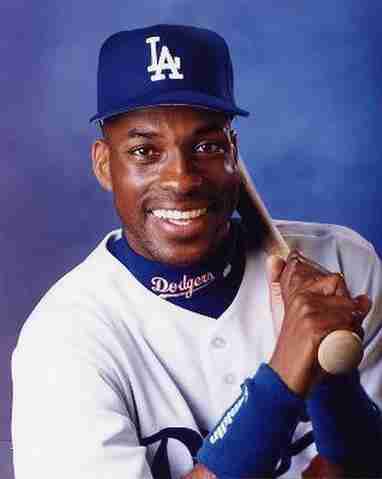
This is the thirteenth of our series where we here at Notinhalloffame.com, do what else? Debate the merit of twenty-four men on the most loaded Baseball Hall of Fame ballot in our lifetime.
Joining me, the site's Committee Chairman, in this debate are D.K. of the site's Phillies Archivist blog and Darryl Tahirali of the site's DDT's Pop Flies blog. This looks to be a very important part of our site, and we hope you will enjoy reading this as much as we enjoyed writing it.
Chairman: Prior to the PED controversy I kept thinking that Fred McGriff was going to wind up being the guy who would go down in history as the man who had the most Home Runs but wouldn’t wind up in the Hall of Fame. That has obviously changed, but I could easily change this to “player untainted with PEDs who has the most Home Runs not entering the Hall”. It was never that I once thought he wasn’t a very good player, or even at times great; but did the “Crime Dog” ever feel special?
He is entering year sixth on the ballot, coming off his all time low of 11.7%. Thirty years ago, wouldn’t this guy be in right away; or does his frequent movement make seem like a high priced journeyman?
Darryl: I do tend to go back and forth on Fred McGriff, but ultimately it is back to he falls just short. Crime Dog is on two cusps: One is that he started a decade before both the players and the numbers got big, so his year-to-year stats look strong but not eye-popping like the Steroids-Era players. Two is that both qualitatively and quantitatively, McGriff is on the cusp of greatness—just shy of 2500 hits, just shy of 500 home runs, and over 1500 RBI.
You may indeed be right: Turn McGriff's clock back 30 years, and his record looks like Willie McCovey's or Harmon Killebrew's. But that's not the case, and what really kills McGriff's chances is that by now the Hall is chock-full of power-hitting first basemen whose numbers are gaudier, and who had dominating peaks, which McGriff never had. He was excellent, but not elite, and you have to draw the line somewhere.
D.K.: Hall Of Fame standards are completely out of whack when a player like McGriff who put up such great numbers (as follows) receives so few votes. 493 home runs - 9 seasons of 30HR or more; 12 seasons of 25HR or more. 2 NL HR titles. 1550 Runs Batted In: 6 seasons of 100 or more RBI; 10 seasons of 90 or more RBI. Just under 2,500 career hits with a.285 batting average.
Man, what does a guy have to do to impress these writers?
Chairman: O.K., let’s play this game. How much does “fame” really matter? As a Jays fan going to the games, I never really thought “Hey, I’m going to watch Fred McGriff play today!” What imagination did he capture? Was he ever at any time considered the best at his position? I know I am arguing against stats, but I just want to throw that out there, and see just what being an icon in the sport means.
We just watched Gil Hodges fail to get into the Veterans Ballot, and while I am not saying that he has better stats than McGriff (he doesn’t), he was a guy who Dodgers fans paid to see. Does that mean anything, or should it? Maybe I am thinking of the romanticism of baseball and sports in general but shouldn’t that matter a little bit?
Unlike Larry Walker who is facing voting issues, McGriff doesn’t have a fan base as he played for three teams for five years and another five for another three combined, he has no real identity that makes any city want to rally around him. That might be why Hodges’ supporters are so passionate, and those of McGriff are non-existent.
D.K.: Playing all or most of one’s career in one city and for one team definitely has it’s advantages regarding the Hall of Fame and that goes for any sport. (I’ve often though that If linebacker Maxie Baughan hadn’t been included in a blockbuster multi-player deal in 1966 and been sent to the Los Angeles Rams and had stayed in Philadelphia his entire career he’d have been in the Pro Football Hall of Fame long ago. He only missed making the Pro Bowl one year in the early part of his career, otherwise he’s have made 10 straight pro Bowls and would have been perfect for the decade of the 1960s (Baughan made the NFL Pro Bowl for the seasons 1960-61 and 1963-69. His top years were split between Philly and LA and even unluckier than being traded from Philly was the fact that he was traded to a city that would lose its NFL franchise and that hasn’t had a team for the last 20 years - so no HOF backing comes from LA, and only some comes from Philly.
Nomadic players or players that test the free agency waters every few years do pay a price (at the gates of Cooperstown, or Canton, or Toronto, or Springfield) eventually. It is the voting writers’ job however, to see what value a player brings to his teams, no matter how often he changes uniforms and to not let a hometown push backing a player who spent all or most of his career with one team sway them unduly.
McGriff has some great numbers if you take the time to examine them. If I had a maximum of 10 choices like the writers do (and they are lobbying to be allowed to vote for 12 players instead of just 10), McGriff wouldn’t be in my first five choices, but he’d be among my ten somewhere.
Darryl: I'm not sure that Gil Hodges is a good comparison in terms of "fame" because he is an outlier--the Dodgers are a storied franchise, particularly the 1940s and 1950s Brooklyn version that is practically worshipped in Roger Kahn's book "The Boys of Summer." That mystique, as I suggested in my article on this year's Golden Era candidates, has probably inflated Hodges's perception--and, as I note, largely without justification. As for the "nomadic" aspect of McGriff's career, he played in the free-agency era, and the writers know that.
Look at Dave Winfield: I never thought of him as being the reigning star on his teams, and he played for six teams during his career. One of those, admittedly, was the New York Yankees, another "mystique" team, and Winfield did reach a Cooperstown milestone of 3000 hits, both of which were undoubtedly factors in his first-ballot election in 2001. I'm surprised that Atlanta isn't rallying around McGriff since three of his five All-Star appearances came while he was on the Braves. But has anyone considered whether his prolonged exposure through those Tom Emanski Baseball Fundamentals television commercials have ultimately soured his chances?
Chairman: You know I never saw those commercials before? Maybe that is the blessing (curse) of living in Canada. After doing research maybe that bright red hat is what should go on the bust; though it won’t happen on my ballot. I vote no.
Darryl: No.
D.K.: I ranked McGriff 10th and gave him my final YES vote. He’s at or near the top of the list when it comes to candidates on this ballot who have thus far been underappreciated by the writers.
The Don Mattingly Debate: 2015
Dec 26, 2014
Written by
Committee Chairman
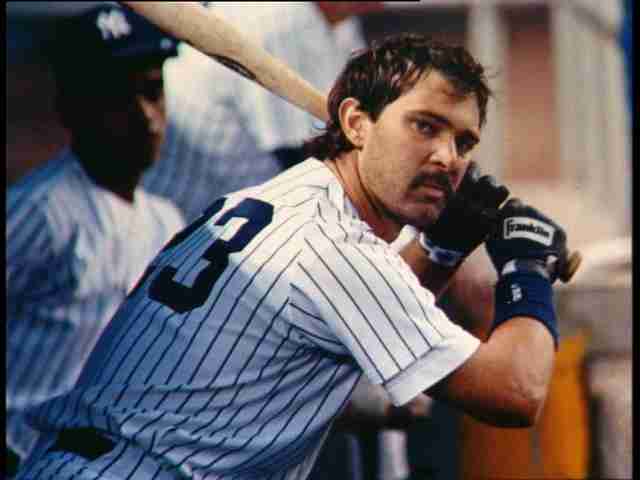
This is the twelfth of our series where we here at Notinhalloffame.com, do what else? Debate the merit of twenty-four men on the most loaded Baseball Hall of Fame ballot in our lifetime.
Joining me, the site's Committee Chairman, in this debate are D.K. of the site's Phillies Archivist blog and Darryl Tahirali of the site's DDT's Pop Flies blog. This looks to be a very important part of our site, and we hope you will enjoy reading this as much as we enjoyed writing it.
Chairman: Donnie Baseball. Mattingly is on his 15th year on the ballot, and I didn’t even realize this until I looked it up. Last year, Mattingly had 8.2 percent of the ballot, his lowest total ever. His highest was 28.2 percent, which was on his first year of eligibility. The second year was 20.3. I really like him, but here is a guy who might be this generation’s Steve Garvey; and I don’t mean because he pretended to be a really good guy in public. Basically, I am saying that sabremetrics is not his friend. With this loaded ballot, I could conceivably see him fall under fiver percent. Now I’m too lazy to look up if anybody ever fell below that 5 percent threshold on their final year, but that would have to be a first right?
Darryl: Well, the saber numbers are not his enemy—it's the counting numbers that are hurting him: Don Mattingly simply doesn't have the big career totals. Only six of his 14 seasons saw him play 150 or more games, and that is indicative of the injuries that dogged him. In the only season in which he played every game, 1986 in his age-25 year, Mattingly led the American League in hits, doubles, slugging percentage and total bases. He hit 31 home runs, drove in 113, and posted a .352/.394/.573 slash line. He had a six-year peak between 1984 and 1989, which is just a little short and he was not quite the dominant player during that time. That would compensate for the light counting numbers, but it never happened. Mattingly falls just short in both areas. And if he does fall below five percent this year, I think that would be more of an indicator of an overloaded ballot.
D.K.: This is his last year on the Writers’ Ballot Mattingly will be a Veterans Committee candidate two years from now in December 2016, for the HOF Class of 2017. If he is to reach the Hall Of Fame at all entrance to Cooperstown via the Vets Committee is his proper level of the Hall. Injuries prevented him from sustaining the type of dominant performance that adds up to a Writers Ballot HOFer, but I could see him getting in through the Vets.
Chairman: I think whatever metric you use, it comes down to a peak period that just wasn’t long enough and a period after that doesn’t measure up no matter how you slice it. I wonder though if he was on better Yankees teams, and whether we want to admit or not, Major League Baseball is more interesting when the Bronx Bombers are good, that if he played for a better team, that he would be closer to induction. Mattingly was the star of bad Yankees teams, but Rizzuto was what on great Yankees teams, maybe the fifth best player? Sorry…but I know that Darryl will understand when I say that Phil Rizzuto is my Percy Sledge. Holy Cow!
D.K.: There’s not much I could add to Darryl’s comment. He said it all – or at least most of it. Mattingly's Saber numbers or I guess you could call them his qualitative numbers are Hall Of Fame-like. It’s his quantitative numbers or counting numbers that weaken his case. His four or five year peak was not dominant enough over a long enough period of time to rate Hall of Fame enshrinement in the minds of most voters. He will be eligible for consideration by the Veterans Committee just two years from now in December 2016 on the Expansion Era committee ballot.
Mattingly has become part of a historical footnote. He is one of three players who had been through more than 10 BBWAA elections when they decided to shorten the number of years players can be voted in by the writers. Three players are being grandfathered in and will receive their full run of 15 years on the ballot as per the old rules. This will be Mattingly’s final year on the ballot, next year will be Alan Trammel’s final year on the writer’s ballot and Lee Smith will have his final vote in 2017. After Smith’s shot in 2017, the 15-year ballots rule will pass into history.
Darryl: At least Percy Sledge had an R&B hit called "Out of Left Field," so he's at least in the ballpark. I'm tempted to say that whether Mattingly was on a good or bad team doesn't, or shouldn't matter, but I don't know. Mattingly's record matches pretty closely to Kirby Puckett's in several ways. Both played at the same time, and even though Mattingly logged two more seasons, both played in nearly the same number of games although Puckett had about 100 more plate appearances and collected a season's worth more hits; thus, Puckett hit several points higher, .318 to Mattingly's .307, but otherwise their slash lines are about the same. Mattingly won a MVP award and was runner-up the following year; Puckett was top five three times. Puckett of course had postseasons heroics on his side as his Minnesota Twins won two World Series. Mattingly only ever saw one postseason series, in 1995, the AL Divisional Series against the Seattle Mariners famed for the "Edgar Martinez double" that won the fifth and deciding game. But we all but forget that Mattingly fairly raked in the series, knocking ten hits including four doubles and a home run for a .417 average while driving in six runs, so who knows what Mattingly could have done in more postseasons. Puckett is a marginal Hall of Famer, but he was worth about eight wins more in bWAR than was Mattingly, and that may be the real difference.
Chairman: I always like Mattingly…especially in his Simpsons cameo: “Mattingly, I thought I told you to trim those side sideburns!” Still, an appearance for Mr. Burns’ company softball team doesn’t get him on my ballot. I vote no.
Darryl: No.
D.K.: No.
The Pedro Martinez Debate: 2015
Dec 26, 2014
Written by
Committee Chairman
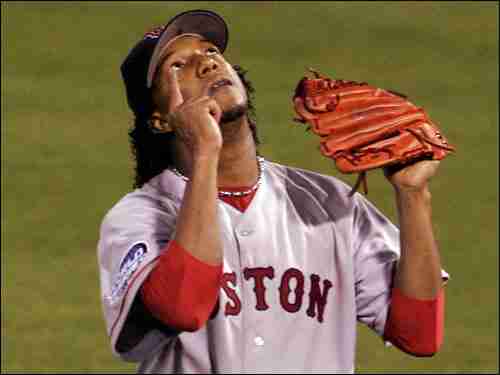
This is the eleventh of our series where we here at Notinhalloffame.com, do what else? Debate the merit of twenty-four men on the most loaded Baseball Hall of Fame ballot in our lifetime.
Joining me, the site's Committee Chairman, in this debate are D.K. of the site's Phillies Archivist blog and Darryl Tahirali of the site's DDT's Pop Flies blog. This looks to be a very important part of our site, and we hope you will enjoy reading this as much as we enjoyed writing it.
Chairman: We have another debut on this year’s ballot, and one that I think has an excellent shot at entering immediately. For the record, I love everything about Pedro Martinez, and for years he was my favorite (non Blue Jay) Pitcher. The only way I see somebody not voting for this guy, is for one of two reasons:
One, he is one of those writers who refuses to put anyone on the ballot because he thinks everyone was on PEDs, or can’t confirm who was and was not. Sadly, we have had some who openly do that.
Two, they are holding on to the archaic view that he only has 219 Wins. Gun to my head, I would build my team around Pedro over Randy Johnson, though I suspect the latter will get a higher percentage of the vote.
Darryl: I would build my team around Randy Johnson—he is more durable. In just under 200 more starts than Pedro Martinez, Johnson had 54 more complete games (he led the league in that category four times; Martinez, once), and pitched 37 shutouts, 20 more than Martinez, and two of Johnson's were no-hitters, one a perfect game. (Martinez once pitched nine hitless innings but gave up a hit in the 10th inning.) I mention this because as a Red Sox fan (they're number two behind the Giants), I still shudder at Pedro's staying in too long in Game Seven of the 2003 American League Championship Series against the Yankees, who tied the game against him and beat the Red Sox in extra innings to go to the World Series. Contrast that with Johnson's pitching heroics for the Arizona Diamondbacks in the 2001 World Series. Simply put, Randy Johnson is one of the most dominant pitchers ever to step on the mound.
Now, that said, Pedro Martinez is not too far behind. Any writer who thinks Pedro was on PEDs deserves to have his ballot privileges revoked permanently: Pedro was a skinny kid from the Dominican—he was a freaking David facing a host of steroids-fueled Goliaths, and like that Biblical stone-slinger Pedro mowed 'em down, one by one. In terms of run prevention, Pedro is better than the Big Unit: Martinez had two seasons with an ERA under 2.00, and Martinez had five seasons with an ERA+ over 200, and this was in the teeth of the Steroids Era; Johnson never matched either one of those accomplishments. In fact, Pedro is the only pitcher on the 2015 ballot, starter or reliever, with a sub-3.00 career ERA; his is 2.93. I've written an extensive article for this site that examines the usefulness—or lack thereof—in determining a pitcher's Hall of Fame worth, so I'll just echo agreement about their being archaic as a primary determinant. Pedro Martinez is one of the elite pitchers in the game's history—he is a first-ballot Hall of Famer without question.
D.K.: I’m still a little miffed that Pedro’s swan song was two World Series losses with the Phillies to the Yanks in 2009. The Yankees won the game by a two game margin and Pedro went 0-2 in the series ...you do the math...and Pedro can still call the Yankees ”his Daddy”.
As a Phillies fan I’ll give him my HOF vote grudgingly because you can’t ignore his stratospheric career winning percentage of .687 - second only to Whitey Ford (and Ford had a Yankees Dynasty backing him).
Chairman: So this looks like a unanimous opinion from us as to whether we think Pedro should be in the Hall. We all think he should, and believe it will be right away. Darryl, no issues from me for you picking Randy over Pedro, they are both giving our fictional teams bona fide aces either way.
Let’s throw this out. Is there any chance that the writer’s give a higher percentage to Martinez than Johnson? I vote no, but there are stranger things that have happened on Hall of Fame voting. Saying that, if he finishes in any other place than second, I would have read four different sources to believe it.
D.K.: Did I mention in round one that in addition to having one of the highest winning percentages of all time at .687 - and to simplify that it means Pedro went 11-5 for every 16 decisions throughout his career, he also is a 3,000 strikeout man. He’s in rarified company among pitchers, but as the luck of the draw has it, he also retired the same year as Randy Johnson and now they each become first-time HOF eligibles as well. Martinez and John Smoltz might suffer by the comparison to Johnson. While they are both in the 220 win range, Johnson won 303 games and while Smoltz and Pedro finished with about 3,100 strikeouts, Johnson dwarfs them again with nearly 4,900 Ks RJ also finished his career with an even 100 Complete Games, and that’s a rare accomplishment in this day and age.
Johnson also gets to be in those cool commercials where hot girls in tight shorts wash his car and mow and water his lawn while he relaxes in a lawn chair. I’ve already forgotten the product name because of those obvious curvy distractions - something to do with removing that grey from your goatee, I think. Well, that’s neither here not there I guess Pedro would be a lock in a normal year, but competing against Johnson, he might lose some votes by comparison, because for all but the last three or four years of his career, RJ was close to being “Superhuman”.
Darryl: Indeed, stranger things have happened on a Hall ballot--Ty Cobb polled more votes than did Babe Ruth on the inaugural 1936 ballot, and not only had Ruth just retired, and thus was fresh in writers' minds, but Ruth revolutionized the game and even then was considered to be the game's greatest superstar; furthermore, Ruth's colorful ways made him an American folk hero while Cobb remains one of the most disliked players of all time.
That said, I'd lay more money on North Korea's getting elected to the United Nations' Security Council than on Pedro Martinez garnering more votes than Randy Johnson this year. But who knows? Maybe that new movie with Seth Rogen and James Franco will help North Korea . . .
Chairman: This is a no-brainer for me. I am all in Pedro and am openly cheering for him to be a first ballot inductee. I vote Yes.
Darryl: Yes.
D.K.: I’m using all my 10 votes. I ranked Pedro 6th. - That means it’s a Yes vote for me.
The Edgar Martinez Debate: 2015
Dec 25, 2014
Written by
Committee Chairman
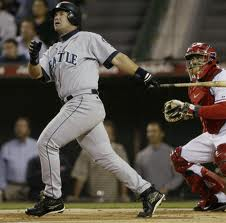
This is the tenth of our series where we here at Notinhalloffame.com, do what else? Debate the merit of twenty-four men on the most loaded Baseball Hall of Fame ballot in our lifetime.
Joining me, the site's Committee Chairman, in this debate are D.K. of the site's Phillies Archivist blog and Darryl Tahirali of the site's DDT's Pop Flies blog. This looks to be a very important part of our site, and we hope you will enjoy reading this as much as we enjoyed writing it.
Chairman: Ahhh…the Designated Hitter. For my entire life, and let’s just state that I am no longer a young man, the DH has been part of baseball fandom and growing up in an American League city (Toronto), I don’t know it any other way. Yet, here we are, with the DH well off the place where he could date a late 20 year old, and he is still judged as too young to be relevant.
Gentlemen, after all of this time do we have a case where the Baseball Writers don’t respect a part of the game that has been a fixture for more than four decades? I have to think that, because if Edgar Martinez, who has to be considered the greatest DH of all time can’t get to 50 percent of the vote, will anyone who forgoes a glove for the bulk of their career ever have a shot?
Darryl: Call me a Polyanna, but I don't think this is a case of outright antipathy toward the DH. Granted, it has taken time to acknowledge the position, and it has been incremental: Paul Molitor was elected, and he played about 44 percent of his games at DH. Frank Thomas went in, and he played about 57 percent at DH. Edgar Martinez played 70 percent at DH, and that is significant: He played about four seasons' worth at third base—and he was a better third baseman than Thomas was a first baseman, and third is a tougher position. But both Molitor and Thomas hit Hall of Fame milestones, the former with 3000 hits, and the latter with 500 home runs. Martinez has terrific qualitative numbers but he doesn't have those counting numbers. By now I think Martinez's bigger problem is the logjam on the ballot, which is affecting almost every candidate—but his time is running out.
D.K.: If I remember correctly Martinez was a decent fielding third baseman before injuries limited him to DH duties. He then set the standards for all DHs with ten .300 seasons, five 100 RBI seasons, over 300 home runs and a .312 career batting average. If elected, Martinez will have played a highest percentage of games at DH than anyone in Hall Of Fame history (almost 70%), surpassing Paul Molitor who DHed in nearly 44% of his career games. Like another of this year’s candidates, Craig Biggio, Martinez was something of a ”Doubles Machine” with 514 doubles lifetime, reaching 50 doubles in a season twice and leading the AL in that category twice also.
I think he’s deserving... it all depends on how open-minded the writers are to having the first real full-time DH in the HOF.
Chairman: Those are great points about Thomas and Molitor, though and based on the percentages you gave about the three (Thomas, Molitor and Martinez), the perception about Edgar as “only” being a DH, isn’t that far off the mark. I do think there is some bias towards the position, though the stiff competition he faces does him no favors.
I think we all agree that Martinez has some serious HOF qualifications, but isn’t a must for any of us. Let me change the question here: With all the great players who were his teammates (A-Rod, Griffey, Randy Johnson) who are all Hall of Fame locks (or would have been had he not been caught lying about PEDs multiple times, and yes A-Rod I’m looking at you) is Edgar Martinez the greatest Seattle Mariner of all time? I’m not saying that he is the best player to ever wear the uniform, but the greatest Mariner, if you catch my meaning.
D.K.: The Hall Of Fame really hasn’t reached the age of the dominant one inning closer. When it does, however, I’d expect Trevor Hoffman to be the first serious contender for the Hall. It’s a reflection of how the game has evolved that the only relievers in the HOF now are those who were expected to go a few innings, if necessary (Wilhelm, Fingers, Gossage, Sutter).
I don’t expect there to be any controversy regarding their possible place in the HOF (once they become eligible) because Billy Wagner, Hoffman and Mariano Rivera were only expected to pitch the ninth inning unlike relievers of previous eras.
However there is quite a fuss over Designated Hitters, players who hit only and don’t field a position, unlike players of previous eras who were both expected to excel at the plate and in the field. - Designated hitters. Edgar Martinez and other DHs didn’t rewrite the rulebook in 1973 that allowed the Designated Hitter in the American League. They merely tried to fulfill that DH role as well as humanly possible and Martinez filled that role better than anyone in the 40 plus years of the DH rule’s existence. I’m leaning strongly towards giving Edgar my vote.
Darryl: Interestingly, the Wikipedia page for Baseball Hall of Fame inductees lists Frank Thomas's primary position as DH (Paul Molitor's is third base). Nothing to take to the bank except that it is being recognized now. And of course the annual award for the best DH has been re-named for Edgar Martinez, who probably best exemplifies the position, but how ironic if he is never elected to the Hall.
However, to your question, Chairman, I'm not sure that Martinez is even the greatest Mariner. Randy Johnson first gained fame in Seattle, but his greatest fame was with the Arizona Diamondbacks. Between the historic contract Alex Rodriguez signed with the Texas Rangers and then his move to the New York Yankees, many people may forget that he started as a Mariner. However, I think that Ken Griffey, Jr., is and will continue to be regarded as the greatest Mariner: The Kid notched his four home run titles and his only MVP award in Seattle. Mariners fans may consider Martinez the hometown favorite because he spent his entire career with Seattle, but I think he will continued to be overshadowed by Griffey, and when Griffey is elected in a couple of years, he will in all likelihood have the Mariners' cap on his plaque--and it is very possible that Martinez will still not have been elected even then.
Chairman: In previous years I would have had him on my ballot, I have to push him off of this one, again due to the logjam. Personally, I think he is a Hall of Famer, but since I can’t vote for twelve, he receives an apologetic no from me.
D.K.: Since the designated hitter has been part of the game in the
American League for over 40 years, I feel that sooner or later they’ll have to start recognizing DHs who really distinguish themselves and separate themselves from the pack. My vote is for Sooner - and thus it’s a YES vote for EDGAR. He made my top 10 at #9 so he gets my vote.
Darryl: No. Not this year.
The Jeff Kent Debate: 2015
Dec 24, 2014
Written by
Committee Chairman
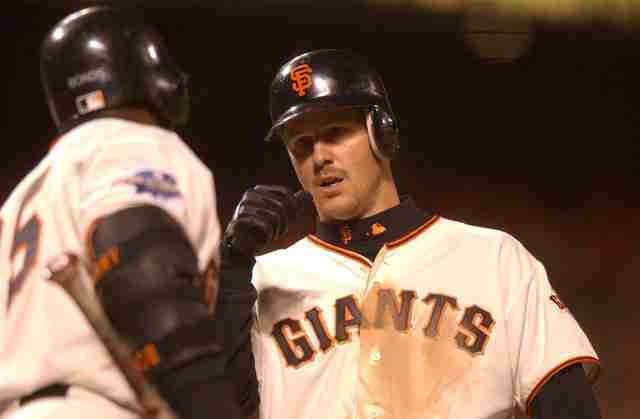
This is the ninth of our series where we here at Notinhalloffame.com, do what else? Debate the merit of twenty-four men on the most loaded Baseball Hall of Fame ballot in our lifetime.
Joining me, the site's Committee Chairman, in this debate are D.K. of the site's Phillies Archivist blog and Darryl Tahirali of the site's DDT's Pop Flies blog. This looks to be a very important part of our site, and we hope you will enjoy reading this as much as we enjoyed writing it.
Chairman: You know guys, even though this is what I do most of my life, I honestly didn’t remember that Jeff Kent made the first year, and especially didn’t remember that he was at slightly over 15 percent last year. Why is that, I wonder? This is a former MVP, a man with healthy numbers, yet here I see a Survivor reject who will put up Don Mattingly voting numbers without the Don Mattingly respect. Do we have someone who was a little overrated to get to this spot, or is the first perception I have accurate?
Darryl: No, I don't think Jeff Kent is overrated, but full disclosure: I'm a lifelong Giants fan, so I have to keep my bias in check. That said, I think Kent is underrated and certainly overshadowed by Barry Bonds, and in that case he probably didn't get a lot of respect—not helped by his own somewhat aloof attitude, but this isn't the Hall of Nice Guys. Besides, we know where they finish. Speaking of finishing, Kent finished 25th in doubles with 560 (tied with Hall of Famer Eddie Murray), 51st in RBI with 1518 (nine more than Mickey Mantle), and even if his 377 home runs are 70th all-time, his 351 hit as a second baseman are the most-ever by anyone at that position. And Kent was at one of the strength positions defensively—2034 games at second base—and even if he wasn't a Gold Glover, he didn't stink: He was about league-average in the field, and it was his bat that mattered. All this said, I think Kent will hang onto the ballot for a few years, but he will be overshadowed and passed over, and a future Expansion Era Committee will have to decide whether he goes in.
D.K.: He has more home runs than any second baseman in MLB history, but what does that really mean? Not known for a winning personality and a player that was known to feud with teammates and writers, I wonder if he is in for a Jim Rice-like candidacy. Which is to say that due to writers who hold grudges against him and refuse to give him their vote for as long as possible - Kent might one day be a Veterans Committee candidate, where a panel of more impartial voters may one day vote him in.
Chairman: So gang, what are we saying here? It seems like we are basically saying we don’t really care if Kent hangs on to the ballot or drops off of it, and if another generation (Veteran’s Committee) wants to look at him, so be it. Maybe that is really what we have here in Kent, is a guy who was damned good, has better stats than you think, but nobody will shed a tear if he doesn’t get in. Hell, I doubt, if Jeff himself gives it any thought! Darryl, as a Giants fan, have you heard an interview where he gives an opinion the subject?
D.K.: Not the most likeable personality, Kent was even an early departure on the TV show “Survivor” - “It’s time to go Jeff - The Tribe has spoken”, but that’s not what we’re really here to judge.
Kent played a yeoman’s 2,034 games at second base and had nearly 2,500 hits.
His 377 home runs is in a class of it’s own for second baseman - and he’s tied on the all-time list in home runs with big bopper, first baseman, Norm Cash. A .290 hitting second baseman with first baseman/outfielder-like power, Kent’s candidacy is starting to grow on me.
I started out in round 1 against his candidacy, but now I can’t help but admit that his numbers are swaying me. It’s going to be an election day decision as to whether he gets my vote - I mean, seriously - It might come down right to the wire!
Darryl: First, I wouldn't say that I don't care whether Kent hangs onto the ballot or falls off, but I do think the latter is more likely in this logjam environment. We will need to see whether his initial 15 percent last year was a first-year spike or is an indication of a groundswell of support, but in either case he will most likely languish in the same range as Fred McGriff or Don Mattingly in this ballot environment. As for knowing his opinion on the Hall, I do not know of any indication Kent has given, but quite honestly I don't follow celebrity personality in any field so I'm the wrong person to ask. As for his Hall of Fame credentials, as a right-handed power-hitting second baseman, Jeff Kent is below Rogers Hornsby--but who isn't?--roughly equal to Ryne Sandberg, and ahead of Joe Gordon, and all three are in the Hall, so I don't think there is any question that he belongs.
Chairman: I will admit that I am not as sold on Jeff Kent as the two of you, I have to say that you have pushed me more on to his cause than I had been previously. Still, I am voting no, but that is far more due to a crowded ballot than anything else. I want to see him stay on so that we can debate this one again.
D.K.: After a slow start Jeff Kent’s candidacy grew on me, particularly since his numbers are great for his position, second baseman. He’s one of my two near misses - the other being Larry Walker. Call him 11A and Walker 11B in my rankings. He’d have gotten my vote if the BBWAA writers had been able to push through their proposal to increase the maximum votes from each writer’s ballot to 12 - A reluctant no for 2015, but I’d vote for him if this logjam of incredible talent ever eases up.
Darryl: No. Not this year.
The Randy Johnson Debate: 2015
Dec 23, 2014
Written by
Committee Chairman
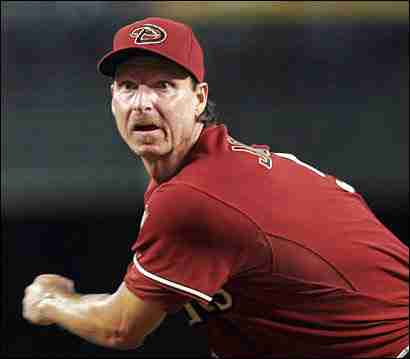
This is the eighth of our series where we here at Notinhalloffame.com, do what else? Debate the merit of twenty-four men on the most loaded Baseball Hall of Fame ballot in our lifetime.
Joining me, the site's Committee Chairman, in this debate are D.K. of the site's Phillies Archivist blog and Darryl Tahirali of the site's DDT's Pop Flies blog. This looks to be a very important part of our site, and we hope you will enjoy reading this as much as we enjoyed writing it.
Chairman: We have Randy Johnson up next; making his Baseball Hall of Fame debut on the ballot; this year’s Greg Maddux. I think you both know where I am going with this one, as I can’t see how he doesn’t follow Maddux as a first ballot inductee. The stats are there, the championships are there, and the awards are there. I think the only thing we are debating is what percentage he gets in at. I’ll put the opening number at 91. How far off do you think that mark is?
Darryl: I'm more bullish than you are—even with Pedro Martinez also making his debut this year, I think the vote total for Randy Johnson is going to be north of 95 percent. Just in terms of sheer dominance, the Big Unit recalls another Johnson, Walter "the Big Train," as well as Sandy Koufax and Nolan Ryan. Yes, his record speaks for itself—and we may never see another 300-game winner in our lifetimes—but two peripheral stats stand out to me: One, he struck out 10.6 batters per nine innings pitched—that's the best in Major League history. Two, his FIP (fielding-independent pitching, factoring only those elements over which a pitcher has total control: strikeouts, walks, hits by pitch, and home runs) is 3.19, which is better than his 3.29 ERA, meaning that he was better at run prevention without eight other fielders on the field with him. The only mystery to me is what the reasons why the few who won't vote for Randy Johnson are going to be.
D.K.: 303 wins a winning percentage of about .650 and the second most strikeouts in baseball history with 4875Ks (only pitcher to come within 1,000 strikeouts of Nolan Ryan). He’s the most “sure thing” candidate to get elected on the first year of eligibility that I've seen in several years.
Chairman: Fair enough. All three of us are in complete agreement that Johnson should become a first ballot Baseball Hall of Fame inductee right away. Maybe, I am looking at a low percentage because I don’t think Cooperstown will do the right thing.
That’s on me, but let me bump up a bit and revise my guess to 94.1% of the vote. Are any of us willing to take the over or under on that? Also, let’s openly ask…will that fabulous mullet be on the Cooperstown bust? I demand a riot in upstate New York if that doesn’t occur!
D.K.: Maybe Johnson gave a writer or two a dirty look or his famed 1,000 yard
stare, after reading their reportage on one of Johnson’s few not-so-stellar outings and those reporters have held grudges all these years. That ‘s the only circumstance that I can see where RJ’s support won’t be unanimous.
Darryl: Greg Maddux got 97.2 percent last year on an overstuffed ballot. Randy Johnson will get 98.6 percent. And regardless of which hat goes on the plaque, there indeed had better be a mullet underneath it.
Chairman: The unanimous vote will never occur, though I would like to hear arguments from the writers who don’t as to why; and it better be a hell of lot better than a protest against the era vote, which we have seen before. Saying that I am an emphatic yes on this one.
D.K.: He’s about as close to a unanimous candidate among the near-600 writers who will cast their votes as you will find. I ranked him as this election’s #1 candidate (by a wide margin over runner-up Craig Biggio). - YES to RJ and there was never a doubt.
Darryl: Yes. Although I know a family of a dead dove who would argue otherwise. Can't believe we haven't mentioned the pulverized bird yet. That's like talking about Ozzy Osbourne and not bringing up bats.
The Brian Giles Debate: 2015
Dec 23, 2014
Written by
Committee Chairman
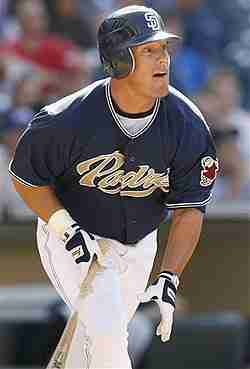
This is the seventh of our series where we here at Notinhalloffame.com, do what else? Debate the merit of twenty-four men on the most loaded Baseball Hall of Fame ballot in our lifetime.
Joining me, the site's Committee Chairman, in this debate are D.K. of the site's Phillies Archivist blog and Darryl Tahirali of the site's DDT's Pop Flies blog. This looks to be a very important part of our site, and we hope you will enjoy reading this as much as we enjoyed writing it.
Chairman: Brian Giles is another one of those guys that when I think of the Baseball Hall of Fame I would ever equate with. Hell, I almost didn’t even include him I the 24 we were going to discuss. The first thing I thought of was here is a guy who was only an All Star twice (and with bad Pittsburgh teams) yet a quick look at his career stats reminded me that he was a lot better than I remembered. Sure he was saddled with some pretty mediocre teams, but a .400 career OBP with some decent power numbers tells me that he wasn’t that far. Hell, if he was half decent defensively he could have been this generations Bobby Grich, who was also “one and done” like I expect Giles to be.
Darryl: "Half-decent defensively" underlines why the comparison between Brian Giles and Bobby Grich won't work: Grich was an excellent middle infielder defensively who was a potent offensive force at a time when middle infielders didn't hit. Giles was a corner outfielder who was expected to show good offense, and he did—surprisingly good, as that .291/.400/.502 slash line shows—but, yes, he was a defensive liability in right field. Giles joins a host of very good outfielders we've seen come onto the ballot in the last few years—Moises Alou, Steve Finley, Luis Gonzalez, Shawn Green—but in terms of career numbers or peak dominance, Brian Giles looks more like Garret Anderson than any of those four. I do like that Giles walked 348 more times than he struck out, unusual in this strikeout-happy era, but that's hardly a blue chip to take to the Hall.
D.K.: Giles had a four year peak between 1999 and 2002 where he averaged 37 home runs per year, but that will be viewed as too brief a period of excellence or dominance. His career totals of 287 HR and 1,897 hits are indicative of a player who was pretty good, but not great - and not a Hall Of Famer.
Chairman: Basically, are saying that we have a decent player who certainly had a good career but debating his merits seems a little pointless, especially on this ballot. Are we agreed on that assessment?
D.K.: Agreed, Chairman. Giles was a well-above average hitter, hitting a robust
.291 for his career, but not much a defender. I had hoped during his career hat he would at least distinguish himself by reaching the 300 home runs and 2,000 hits milestones, but from a combination of aging and injuries he failed to do even that. Giles was a pretty good ballplayer, especially at the plate, but not a Hall Of Famer.
Darryl: Agreed. Giles was an excellent player, not an elite one. And I don't think he would merit much attention on any ballot in previous years or decades.
Chairman: With all due respect to Brian Giles, who had a solid career, this is my easiest no. In retrospect I let decent numbers cloud me into thinking he may have worth discussing.
D.K.: I really liked Giles and he did have those four years of 35+ home runs, but I can’t vote for him. - NO
Darryl: No.
The Nomar Garciaparra Debate: 2015
Dec 23, 2014
Written by
Committee Chairman
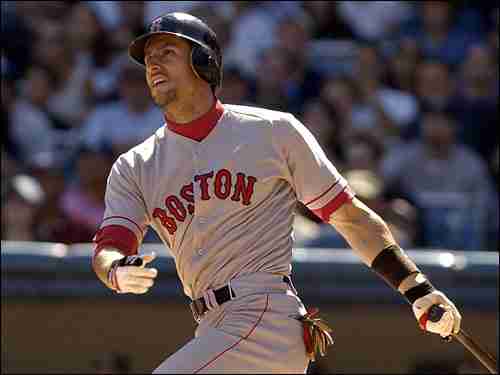
This is the sixth of our series where we here at Notinhalloffame.com, do what else? Debate the merit of twenty-four men on the most loaded Baseball Hall of Fame ballot in our lifetime.
Joining me, the site's Committee Chairman, in this debate are D.K. of the site's Phillies Archivist blog and Darryl Tahirali of the site's DDT's Pop Flies blog. This looks to be a very important part of our site, and we hope you will enjoy reading this as much as we enjoyed writing it.
Chairman: Ah…”Nomah”. I don’t know about the two of you but when I think of Garciaparra in relation to the Baseball Hall of Fame all I can think is that is this was 2003, the three of us would have said in unison (or so I think we would) that this guy was a future Baseball Hall of Famer, and probably on way to being a lock. It didn’t quite work out that way did it, and now when I think of Garciaparra, I think of Jimmy Fallon’s skit on Saturday Night Live, where he and Rachel Dratch played Boston fans. Not exactly the first thought you should come up when discussing a Hall of Famer is it?
Darryl: Nomar Garciaparra demonstrates just how amazingly difficult it is to become a Hall of Famer: A player must have both career longevity and an exceptional peak period—and not simply be a reliable compiler. Garciaparra roared out of the gate, and in 2003 we would have indeed declared him to be on the fast track for the Hall. His first half was Hall-worthy, but the drop-off from 2004 on killed his chances, and that is the sad fact about baseball immortality. A few players have made the Hall based on peak period alone, but those players—Sandy Koufax, Ralph Kiner—so dominated their periods that they overwhelmed the competition, and although Koufax was first-ballot, Kiner got in on the writers' vote by the skin of his teeth, literally—one vote over the minimum in his final year of eligibility. Garciaparra's early peak was not as dominant, although that may say more about the high talent compression in Garciaparra's time than his relative lack of absolute dominance—there are more good players now than in Koufax's or Kiner's time.
D.K.: Hit .313 lifetime, but he won’t get much support for the HOF. At one time he was considered on a par with Jeter and A-Rod among major league shortstops. Then a ton of injuries befell him and shortened his career. Unfortunately, the HOF doesn’t reward players on their potential or what they might have accomplished if they had stayed injury-free.
Chairman: So does this mean that mean that the three of us can agree that Nomar is one and done? Seriously, even with the most loaded ballot in recent memory would it matter? My question to the both of you is would Garciaparra make it to a second ballot if it were a less loaded list? Personally, I don’t think so, but I want to hear your thoughts on it.
Darryl: Yes, I do think Garciaparra would make it to subsequent ballots without so much competition, and he may in fact do just that this year anyway: Back-to-back batting titles and that .313 career batting average carry some weight. I'm reminded a little of Kirby Puckett here, who was voted into the Hall on his first ballot with only a 12-year career, although how much of that was sympathy for his glaucoma we may never know, and whether Puckett could have done that on this ballot is also uncertain, but I highly doubt it. So, although he won't get in, I'm not so sure that Nomar will be a one-and-done even on this ballot. On the other hand, I had Kenny Lofton pegged as a Hall of
Famer two years ago--and I still think he is--but he did not last past his first ballot.
D.K.: I think some writers will remember Nomar’s batting titles and his peak injury-free years and that will result in Nomar receiving 15 to 20 % of the vote. He’s not a “One and done”, but his position will be precarious and he may not make the full run of ten years on the ballot before dropping out with less than 5% some year.
Chairman: You are both more optimistic than I, as unless there are a lot more Boston sportswriters who have a say, I don’t think he gets off the maiden voyage. He wouldn’t on my ballot, as I vote no.
Darryl: No to No-mah.
D.K.: I vote No too, but I’m not crying for him. He married Mia Hamm. The same Mia Hamm. Nomar isn’t a HOFer but he does have Mia for consolation.


